© 2024 ALLCITY Network Inc.
All rights reserved.

The Bradley Beal trade sent shockwaves throughout the NBA as the unofficial start of the offseason, but the Phoenix Suns are just getting started. They still have work to do in order to round out their roster, and it starts with an abundance of Deandre Ayton trades to consider.
On paper, a “Big 4” of Devin Booker, Kevin Durant, Beal and Ayton seems enticing. Even after an underwhelming season where DA regressed in a number of areas, there’s some hope a coaching change to the more defensive-minded Frank Vogel can restore Ayton to the reliable, two-way force he became during Phoenix’s run to the 2021 NBA Finals.
However, one of the biggest takeaways from the Beal trade was the overwhelming feeling that Ayton’s days in the Valley are numbered. NBA teams sense it too, with a number of them reportedly calling Phoenix about his availability:
Following their latest blockbuster trade, the Suns are already have $173.7 million on the books for next season between Booker, Durant, Beal, Ayton, Cam Payne ($2 million guaranteed of his $6.5 million salary), Ish Wainright ($1.9 million team option), Jordan Goodwin ($1.9 million partially guaranteed) and Isaiah Todd ($1.8 million guaranteed).
That means they’re already $5.6 million away from the second luxury tax apron with only eight players on the books. Even after filling out their remaining seven roster spots with veteran minimum deals, they’ll breeze past that $179.5 million threshold.
Once that happens, based on the reporting we’ve seen on the new CBA thus far, the Suns will lose their $5 million taxpayer mid-level exception. The amount of extra salary they can take back in trades will be reduced from 125 percent to 110 percent, and they will no longer be able to add players via sign-and-trades or on the buyout market (if the bought-out player’s salary exceeds $12.2 million).
Next summer, if the Suns are still above the second luxury tax apron (as they’re projected to be), they will no longer be able to aggregate outgoing salaries in a trade, send out cash in trades, or trade for players who were signed-and-traded.
The Suns don’t need to trade Ayton, because even with a trade bringing back less salary than his $32.5 million, they’re almost guaranteed to cross that second tax apron. Owner Mat Ishbia’s strategy is less “avoid the apron” and more so “if we’re opening that door, why not smash right through it?”.
However, the Denver Nuggets’ run to the championship served as a reminder about the importance of complementary role players. Guys like Aaron Gordon ($19.7 million) and Kentavious Caldwell-Pope ($14 million) represent the exact types of contributors — and contracts — the Suns need around their star trio. Turning Ayton’s inflated salary into two or three players in a similar price range might help build out the Suns’ playoff rotation.
Ayton’s contract is hardly an albatross, and at 24 years old, there’s still belief he can still thrive with a change of scenery. There will be a market for his services, and although he can veto any trade leading up to July 15, we’re operating under the premise he’d embrace a fresh start elsewhere (as ESPN’s Tim MacMahon reported weeks ago). The Suns have always been uneasy about paying DA max-level money, so if they believe they have the talent to get by with another center, who does 80 percent of what Ayton does for two-thirds of the cost, plus another rotation-level wing, it’d make sense to pursue such a move.
As the 2023 NBA Draft approaches, trade talks heat up. This week will be no different, especially as the Suns approach July 1, at which point their 125 percent threshold for absorbing extra salary drops to 110 percent. Outside of convincing outside free agents to take a discount at the vet minimum, this is the Suns’ last gasp to improve their depth. Bearing all that in mind, let’s dive into a sea of Deandre Ayton trades.
NOTE: The sheer volume of trades here is not meant to convey any sense of urgency that the Suns dump DA for peanuts. Rather — as is always the case with these trade articles — this is meant to serve as a thought exercise to produce a better understanding of what a potential deal might look like. The massive quantity of trades is due to Ayton quite literally being Phoenix’s last attainable player who has significant trade value, so with the draft right around the corner and only one possible Suns move left to make, we’re leaving no stone unturned.
Orlando Magic
The Suns are unlikely to get back a center with DA’s ceiling, but the Magic are one of the few teams that can offer a big man who’d be an ideal fit for what Phoenix needs at the 5.
Wendell Carter Jr.’s 15.2 points, 8.7 rebounds and 2.3 assists per game don’t quite measure up to Ayton’s numbers, but his rebounding figure was slightly diminished by the multitude of big men he shared the court with. His 0.6 blocks per game feel low, but the 6-foot-10 big actually checked out as a more effective rim deterrent than DA, holding opponents to 4.3 percent worse shooting at the rim. For reference, Ayton held opponents to 2.9 percent worse shooting.
Carter has more range, shooting 35.6 percent on 3.9 3-point attempts per game last year. He’s also making an average of $12 million over the next three seasons — a perfectly team-friendly amount that’s movable in future trade scenarios that may arise.
Orlando’s interest in Ayton is real, as a source told PHNX Sports they’ve offered a package of Carter, Jonathan Isaac and Bol Bol for his services. Such a deal would require the Suns to increase the guarantees, since only $7.6 million of Isaac’s $17.4 million salary is guaranteed, and Bol’s $2.2 million salary is fully non-guaranteed.
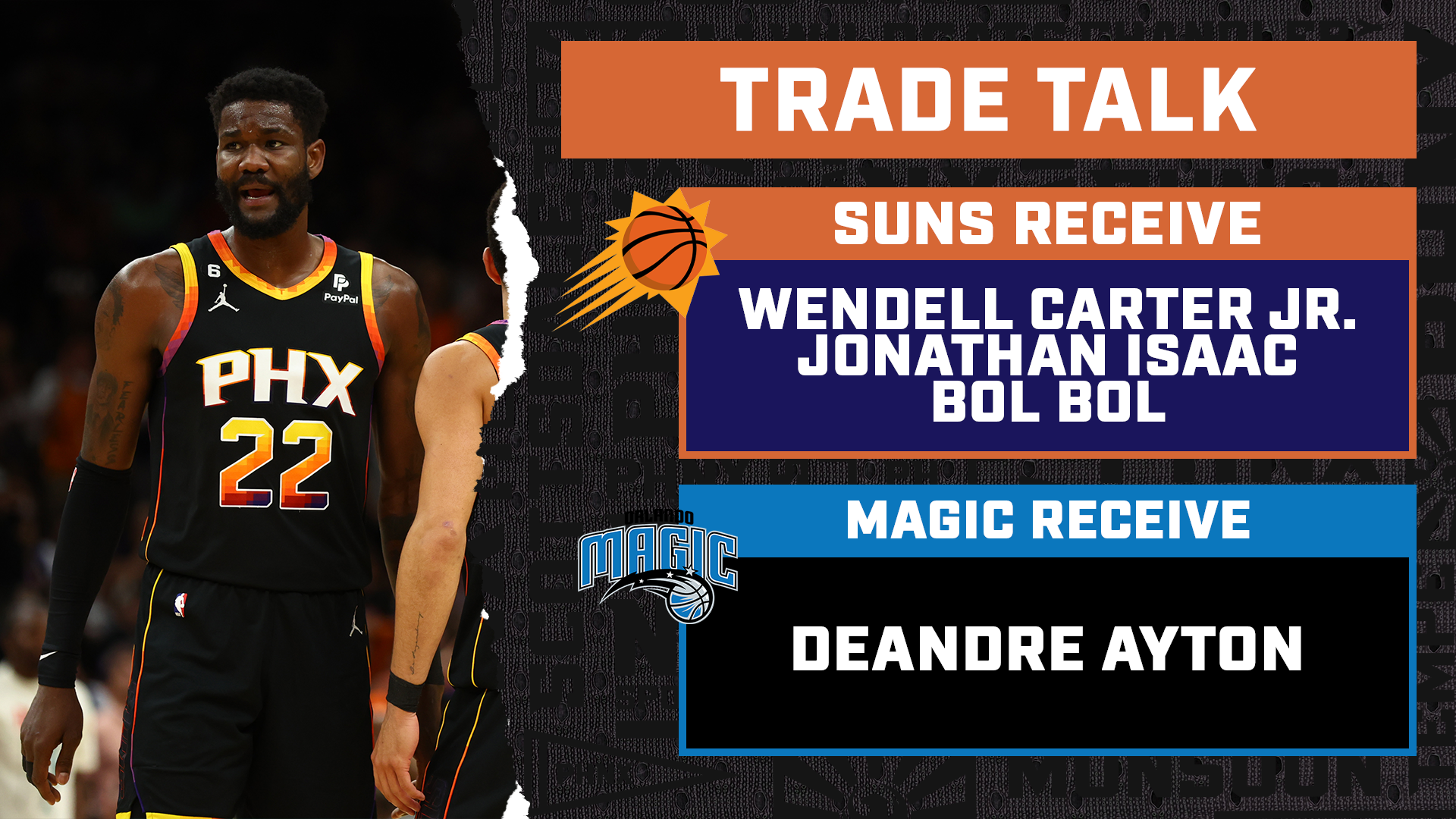
These talks came before the Beal trade, and when the Suns tried to get the Magic to include a guard of some sort, Orlando hedged on that. Whether things have changed since the Beal deal remains to be seen, but there are several avenues these two teams could explore based on that framework.
From the Suns’ perspective, leaving out the injury-prone Isaac and pushing for Markelle Fultz instead would make sense. Jalen Suggs should be off-limits, and while Fultz is a significant cog in the Magic’s youth machine, he’s hardly a cornerstone.
His 14.0 points, 5.7 assists and 3.9 rebounds per game last season don’t scream “indispensable.” Although he’s finally looking like a starting-caliber point guard entering his seventh year in the league, this former No. 1 overall pick is neither a finished product nor untouchable. He provides enough playmaking, point-of-attack defense and youth (he just turned 25) to interest Phoenix, however.
Again, the Suns would have to increase the guarantees to make the trade math work, since only $2 million of Fultz’s $17 million expiring salary is guaranteed.
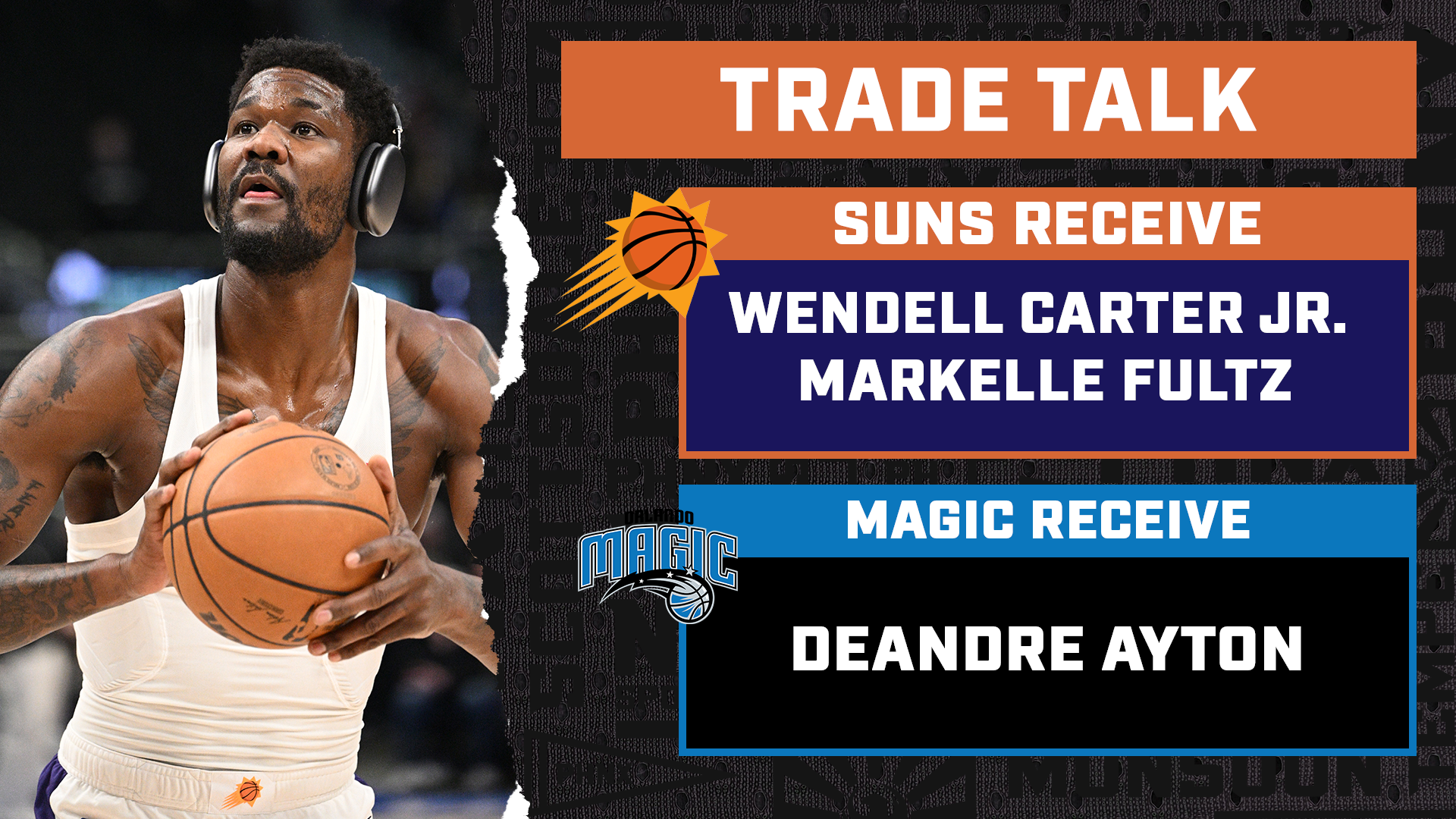
If Fultz is out, putting Bol back in the deal while pivoting to Gary Harris could net a decent return. Bol is still only 23 years old, and he’s coming off his first season in the NBA where he looked like a legitimate rotation player. Although the Magic only won 34 games, Bol averaged a well-rounded 9.1 points, 5.8 rebounds and 1.2 blocks a night. His 26.5 percent shooting from long range left a lot to be desired, but for a stretch near the start of the season, he established himself.
As for Harris, the 28-year-old vet is no longer the 3-and-D guard he once was, but he’s still a career 37 percent shooter from deep who made a career-high 43.1 percent of his triples last year. The Suns need veteran, two-way wings, and perhaps a change of scenery to a winning situation under a coach like Vogel would revive Harris on the defensive end.
Harris’ $17 million expiring salary is fully non-guaranteed, so the Suns would once again have to increase the guarantees to facilitate the deal:
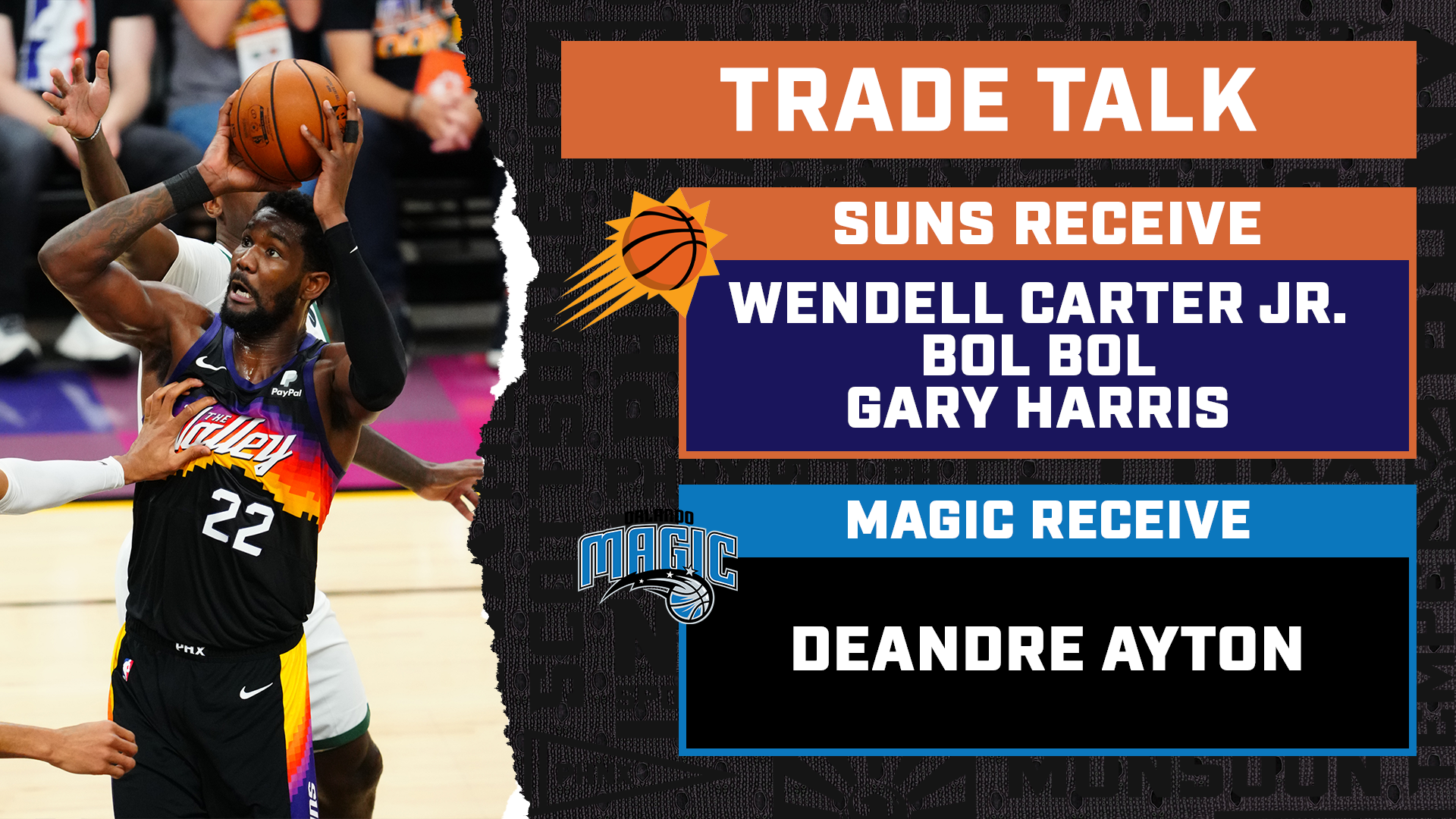
Let’s say Carter and Harris are available, but the Magic take Fultz and Bol Bol off the table. A natural counter would be to push for either Cole Anthony or draft compensation instead.
Anthony has a $5.5 million team option for next season before becoming a restricted free agent in 2024. He’s a flawed player and not much of a playmaking point guard, but he’s been a double-digit scorer since he entered the league and is coming off his most efficient season yet, averaging 13.0 points in just 25.9 minutes per game while shooting 45.4 percent overall and 36.4 percent from 3.
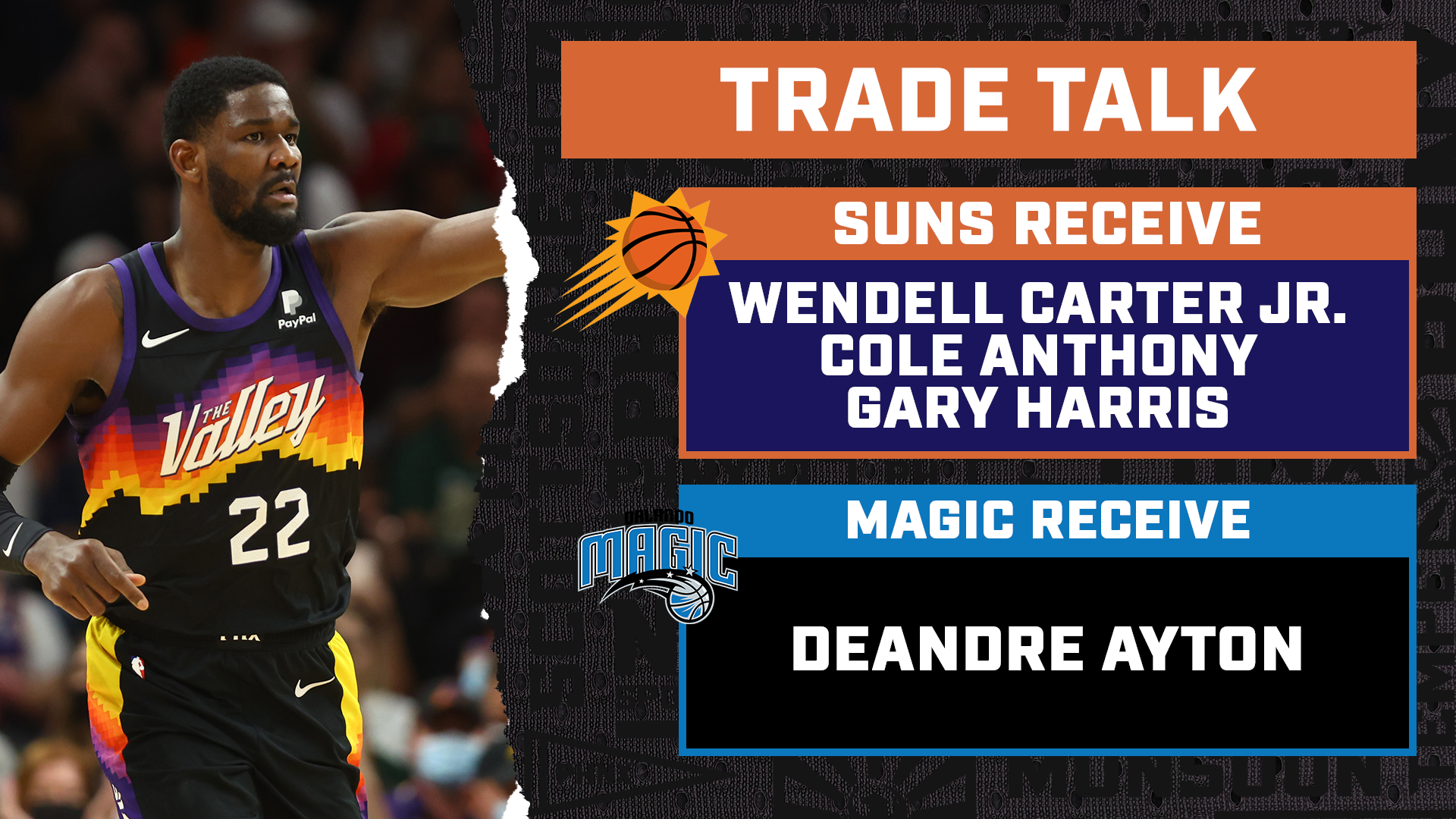
Anthony barely turned 23 in May, so there’s untapped potential there for a Suns team in need of bench scoring and depth.
If Phoenix isn’t interested, or the Magic take him off the table, they could pivot to Orlando’s 36th overall pick in this year’s draft:
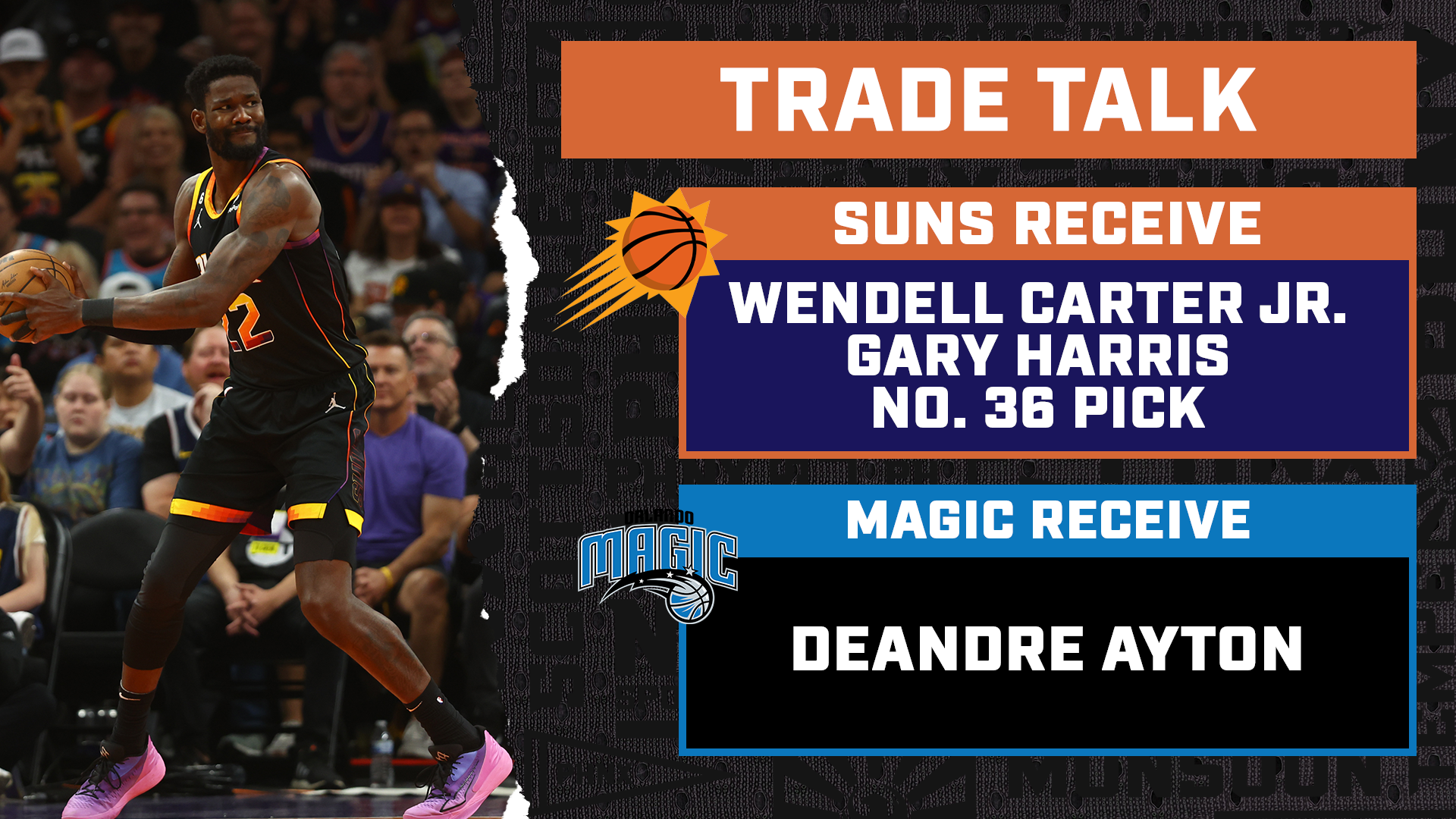
A second-round pick on top of a DA downgrade and a 3-and-D guard who’s struggled with injuries doesn’t sound like much, but this year’s draft class has plenty of 3-and-D wings to choose from. Phoenix has ignored the draft for far too long now, and finding bench contributors on rookie-scale contracts is how great teams remain relevant for the long-term.
Dallas Mavericks
According to one source, the Dallas Mavericks have had a standing offer on the table for DA since the end of the season: Tim Hardaway Jr., Josh Green and the No. 10 overall pick in this year’s draft.
The math doesn’t work on such a trade, but throwing in Maxi Kleber does:
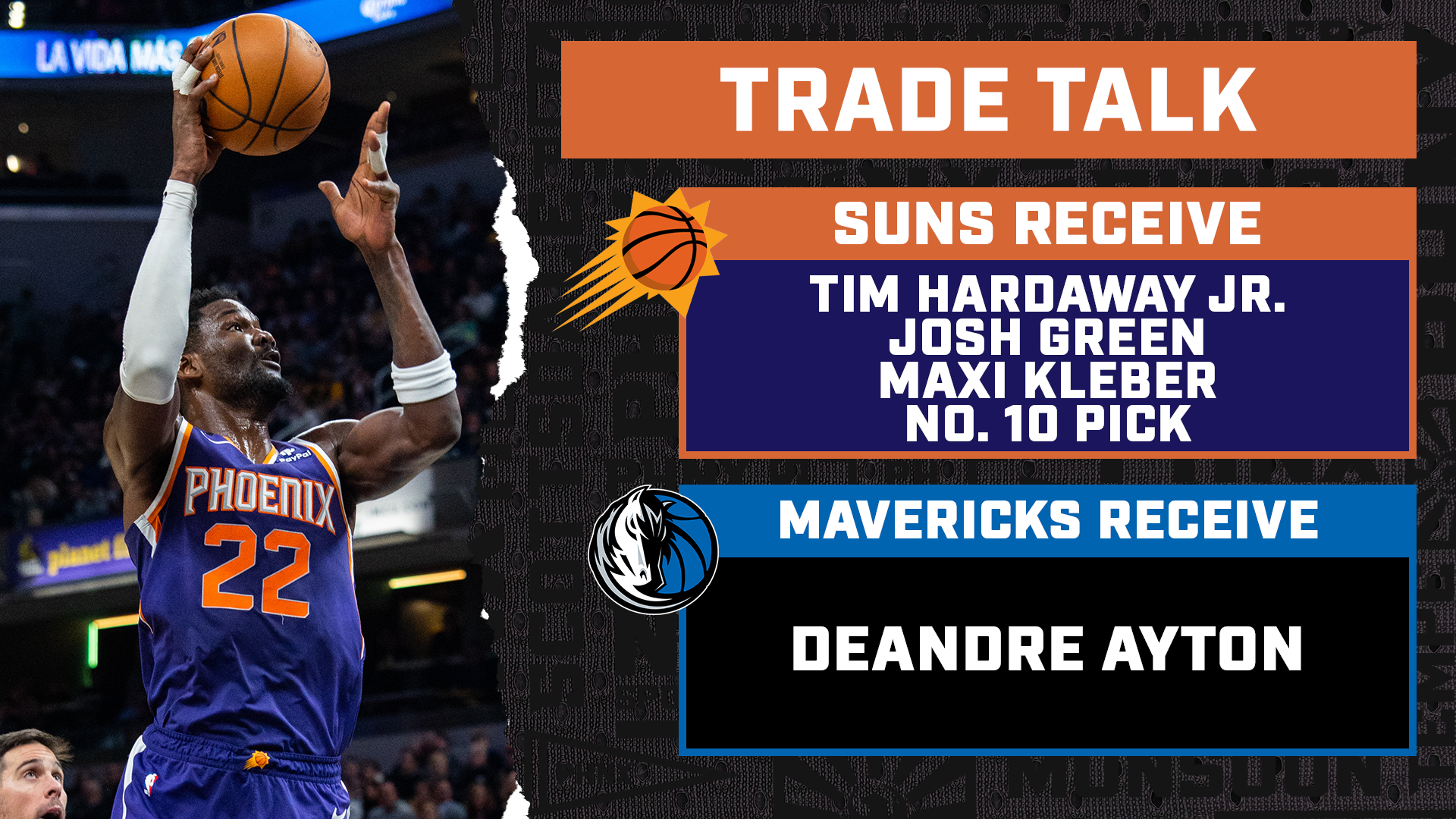
To this point, the Suns haven’t caved on what feels like more of a last resort. They’d gain three decent role players, including one younger wing with potential and a top-10 pick (which the Mavs would have to use on a player of the Suns’ choosing before ultimately trading him to Phoenix after draft night).
But that’s hardly a fitting return for Ayton. Hardaway is a reliable shooter when healthy, having shot at least 38 percent from distance in three of the last four years. Green is coming off his most promising season yet at 22 years old, averaging 9.1 points per game on .532/.402/.723 shooting splits while doubling as an excellent ball-screen navigator.
But Hardaway and Kleber are both 31, and Kleber’s reputation as a stretch-big has taken a hit in recent seasons. In 2019-20 and 2020-21, he shot 37.3 and 41 percent from deep. Over the last two years, he’s plummeted to 32.5 and 34.8 percent while struggling to stay healthy.
If the Suns are really backed into a corner, substituting Davis Bertans for Kleber might make more sense:
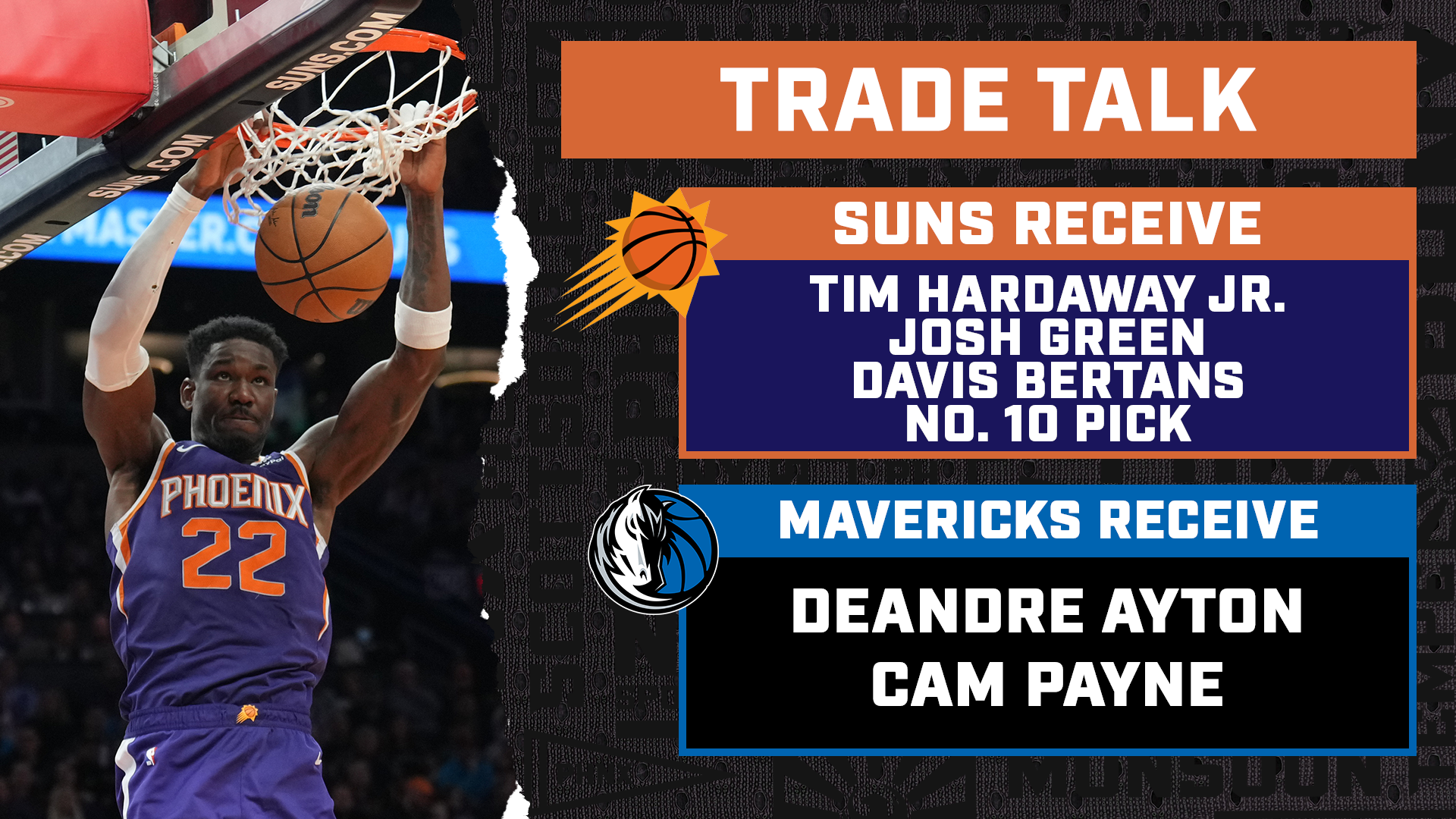
In this scenario, Cam Payne is included to help match salaries, and the Mavs would have to increase his guaranteed amount if the Suns crossed the second luxury tax apron by then.
Bertans is more of the stretch-big the Suns would want, having shot 39.8 percent from deep for his career. However, he’s a worse defender than Kleber, his $17 million salary is a bit larger than Kleber’s $11 million, and Bertans’ $16 million early termination option for 2024-25 further complicates the Suns’ cap situation moving forward.
In any case, both of these deals feel like settling, with not nearly enough coming back to Phoenix to erase the sinking reality of DA joining Luka Doncic in Dallas.
Atlanta Hawks
Because of the Hawks’ bloated salary cap sheet, their number of serviceable rotation players and their desperate need to change things up, Atlanta has shown up in our Deandre Ayton trades for over a year now. Even after the Beal blockbuster, they make sense as a potential trade partner.
Vogel has always had elite shot-blockers to work with on the interior, and though he’s lost a bit of a step in that category, Clint Capela fits the exact mold of what the Suns need.
Screening and rim-running? Check. Shot-blocking? Check. Superior rebounding? Check. Capela has nowhere near the midrange game that DA has, but his 12.0 points, 11.0 rebounds and 1.2 blocks per game on 65.3 percent shooting showcase a big man who knows his role and would fill it perfectly alongside the Suns’ star trio.
Adding in a sharpshooting wing with upside like Saddiq Bey wouldn’t hurt either. To make the math work, the Suns could add Vit Krejci, increasing the guaranteed amount on his $1.8 million fully non-guaranteed salary.
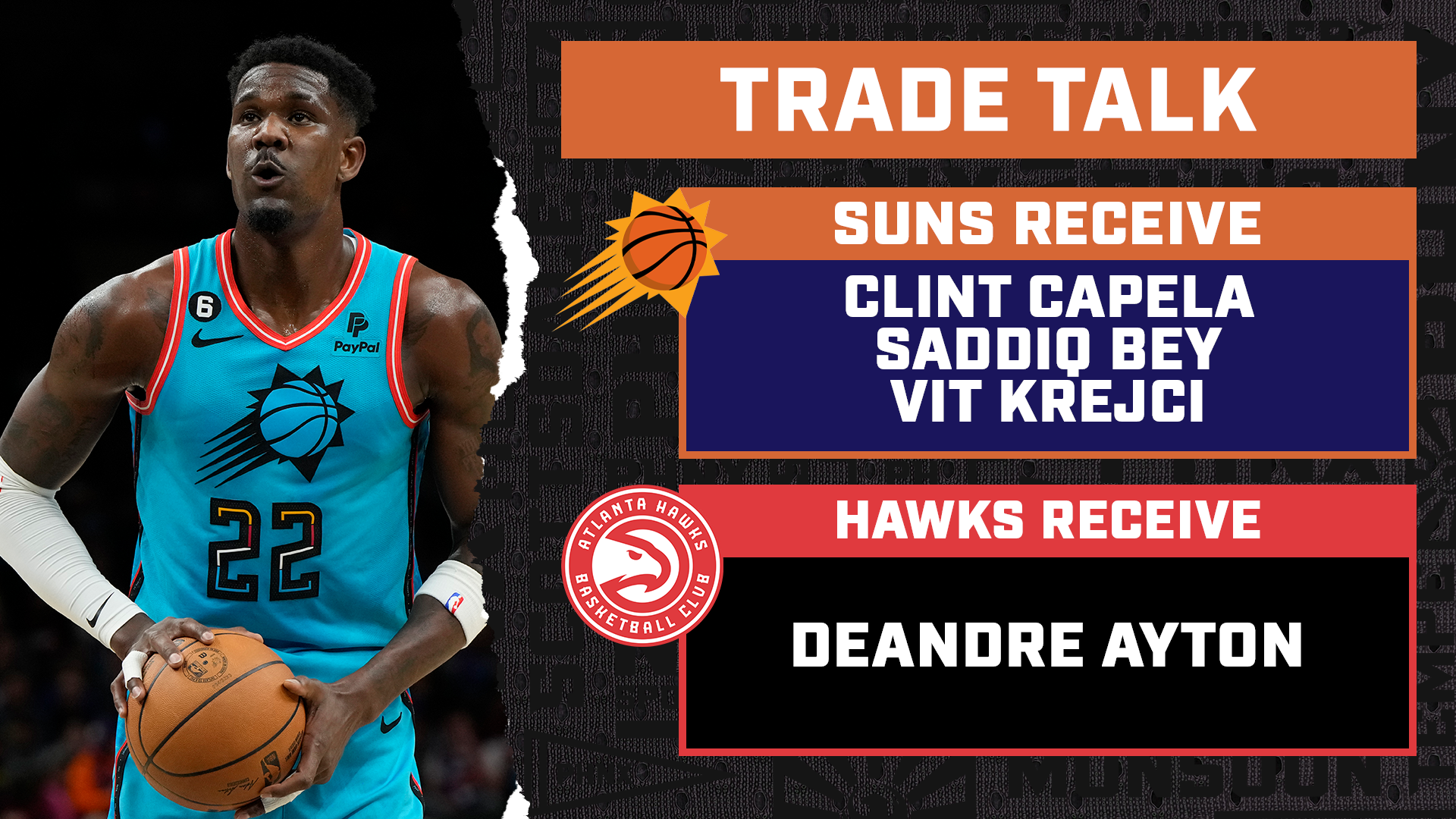
It wasn’t long ago that the 24-year-old Bey felt like an instrumental part of what the Detroit Pistons were building. His 3-point shooting has been a bit inconsistent, but he’s still canned 36.1 percent of his triples through his first three seasons. Playing with three gravitational scorers like Booker, Beal and KD would allow him to feast as a guy who’s made 39 percent of his catch-and-shoot 3s for his career.
Krejci, meanwhile, hasn’t played enough meaningful minutes in his first two NBA seasons to get a proper read on, other than the fact that he’s a 6-foot-8 guard who’s still only 22 years old.
The Hawks’ top priority remains getting out of the John Collins contract, and the Suns have reportedly had interest in him recently. But unloading the remaining three years and $78.5 million of his deal comes at a price, and in this case, it’s Onyeka Okongwu.
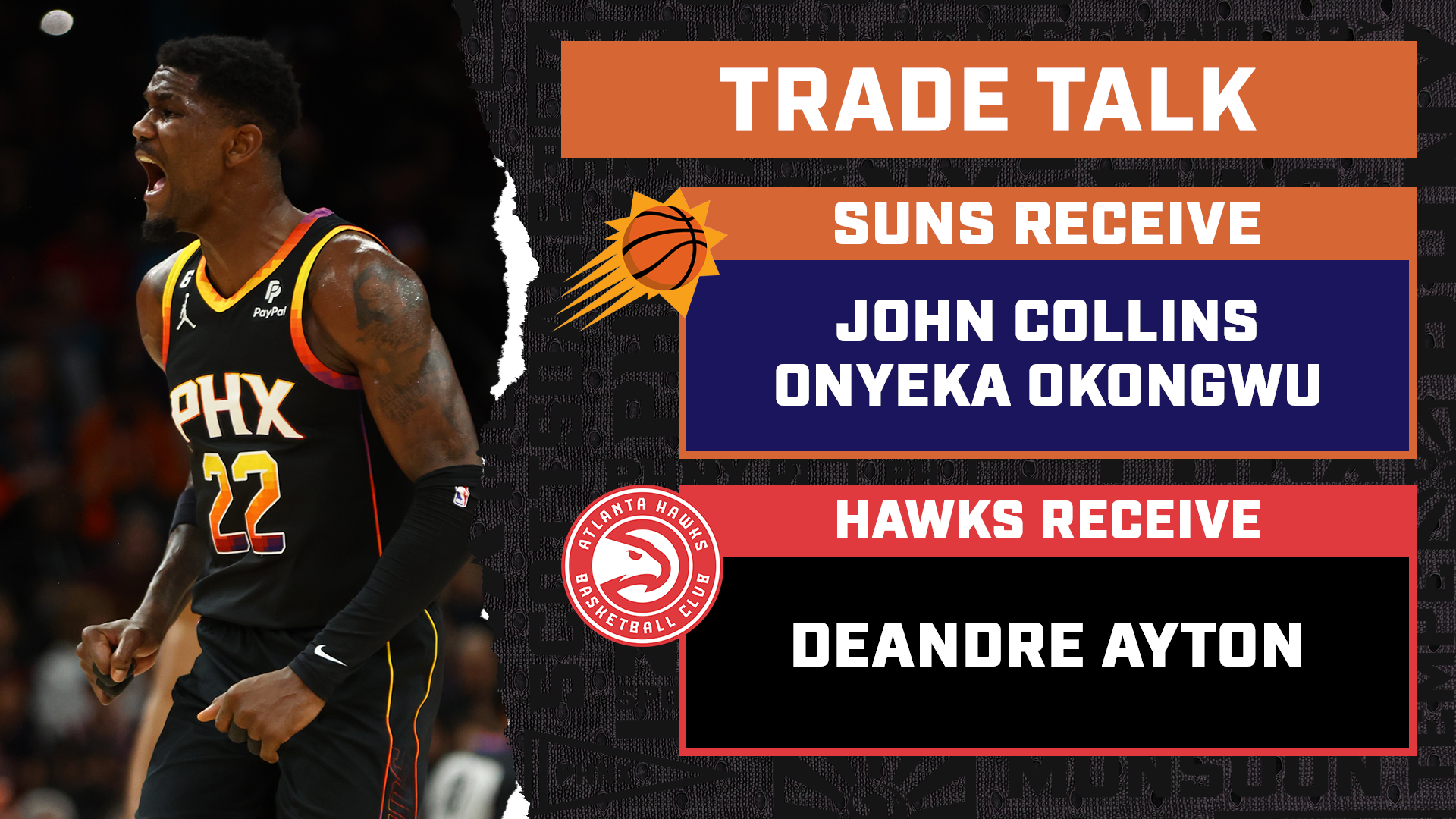
Capela feels like Atlanta’s current starter, while Okongwu feels like the future. But if the Hawks are trading for DA, they may be open to moving the 22-year-old they drafted with the sixth overall pick back in 2020.
Okongwu is a bit rawer than the Suns might prefer from their starting center, but there’s no question he’s productive. Last year, he averaged 9.9 points, 7.2 rebounds and 1.3 blocks in just 23.1 minutes per game. He has room to grow as a 22-year-old, but he only makes $8.1 million this season and is extension-eligible before becoming a restricted free agent next summer.
If the Suns really get greedy, they could’ve tried pushing for Okongwu and Bogdan Bogdanovic, leaving Collins’ big contract untouched. Unfortunately, such a deal wouldn’t be possible until September, thanks to Bogdanovic’s recent contract extension in March. That might leave this one as more of a midseason trade option if the Suns decide to keep DA to start the season and it doesn’t pay dividends.
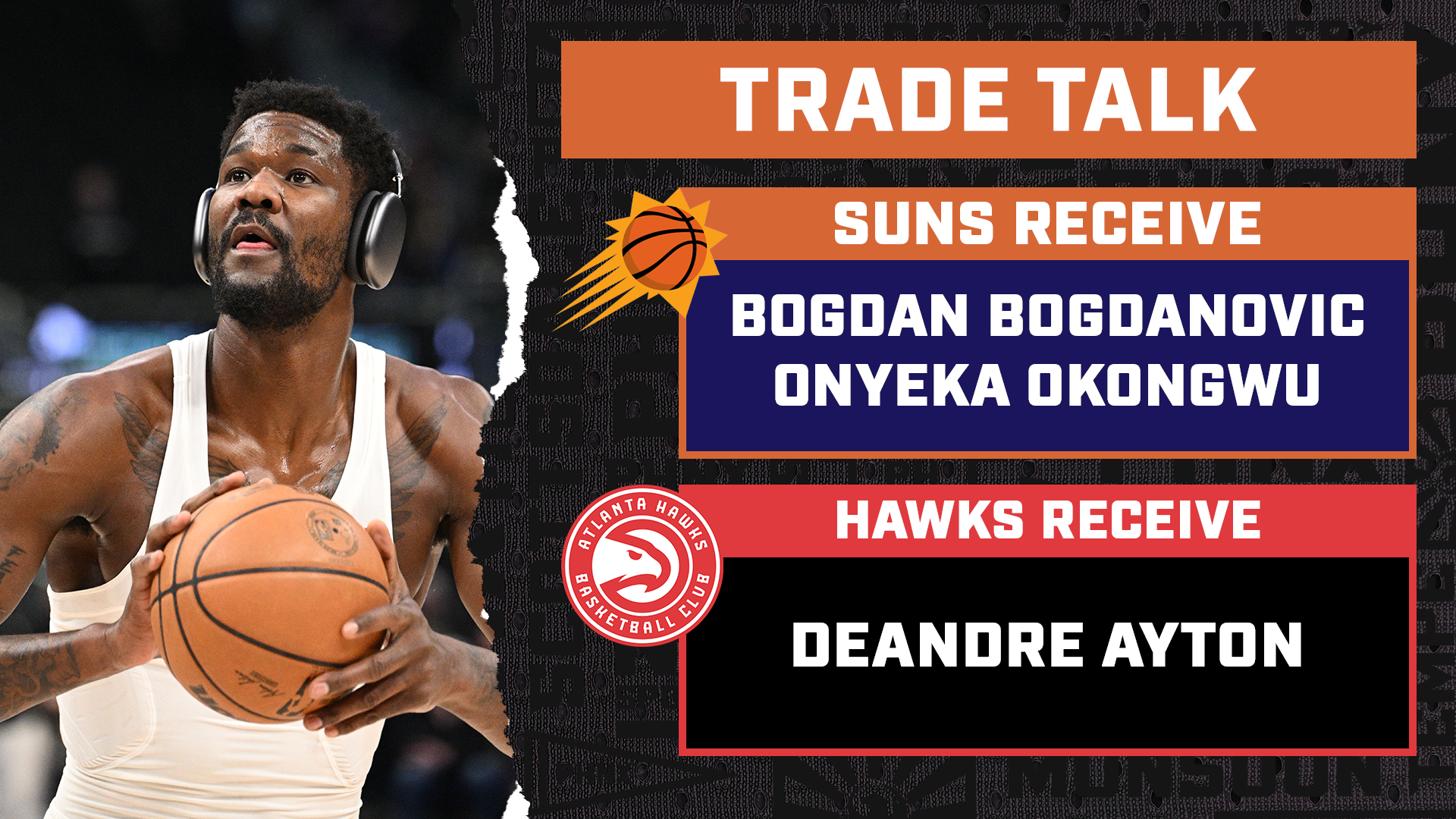
Double Bogdan was originally going to be a Sun before a draft-day trade sent his rights to the Sacramento Kings. He’d still be a perfect fit in Phoenix as a shot creator, off-ball shooter and secondary playmaker who could lead the scoring charge off the bench.
Bogdanovic may turn 31 in August, but when he’s been able to stay healthy, he’s the exact type of player — and manageable contract, with four years and $68 million remaining — the Suns should be targeting.
However, given Bogdanovic’s problems with staying on the court over the last few years, and because he and Okongwu may be too rich for the Hawks’ blood, we’re back to Collins. This time, Bey and Atlanta’s 15th overall pick get thrown in:
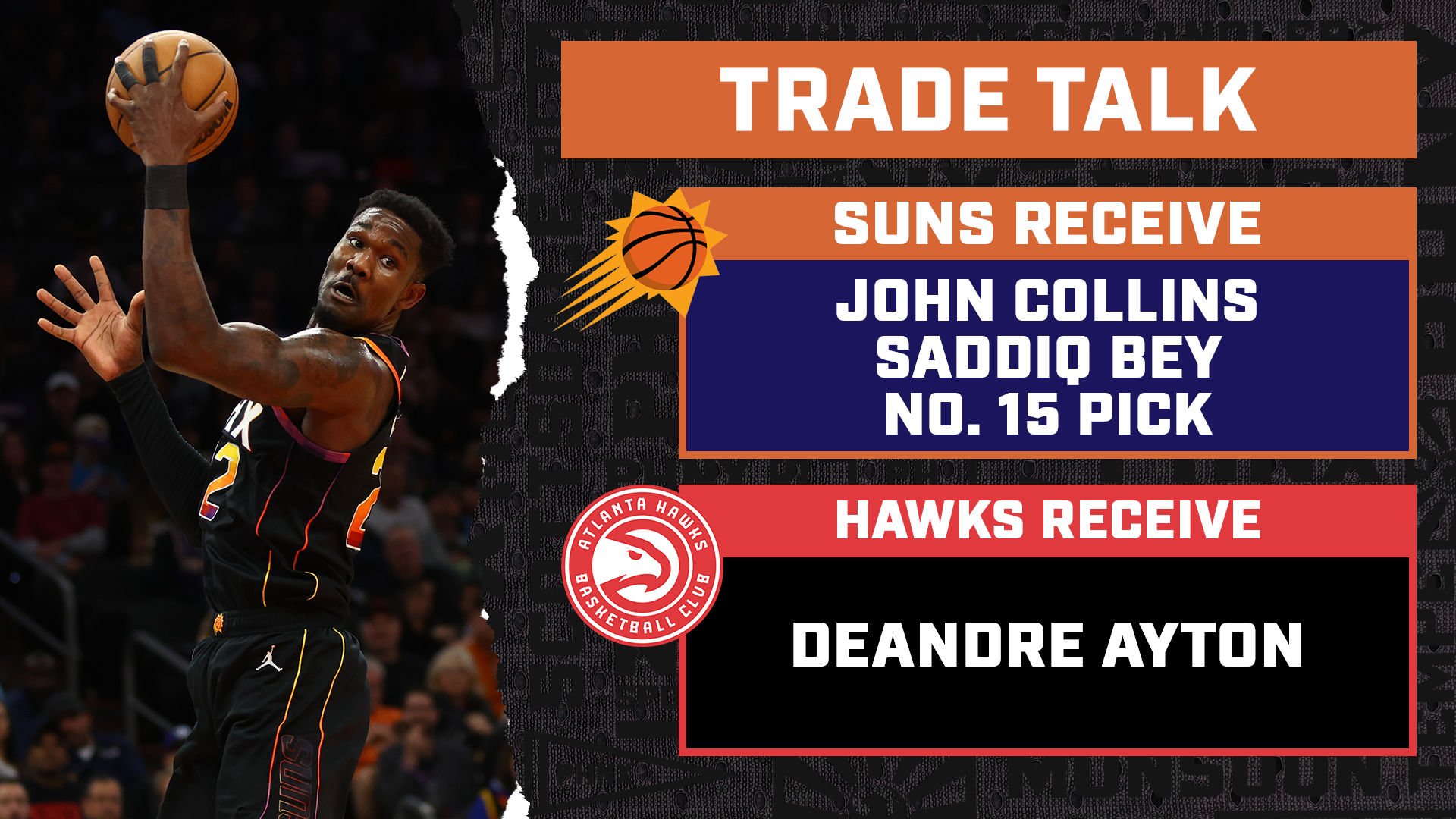
The Suns get a rim-running 4 in Collins, a 3-and-D wing with potential in Bey, plus their pick in a wing-heavy draft midway through the first round.
However, Collins’ inconsistent 3-ball and Bey’s overall inconsistency fail to land the Suns a sure thing in this exchange, and given Phoenix’s recent draft history, that 15th pick could easily wind up feeling like a crapshoot.
The best possible Hawks deal the Suns could get? Capela and Bogdanovic for Ayton and Payne, with Atlanta keeping Okongwu, Phoenix getting the more experienced center, and Collins’ inflated contract staying in Georgia. But again, that couldn’t happen until Bogdanovic is trade-eligible in September, and the Hawks would have to increase Payne’s guarantee to ensure the Suns fit within that 110 percent threshold as a team in the second luxury tax apron.
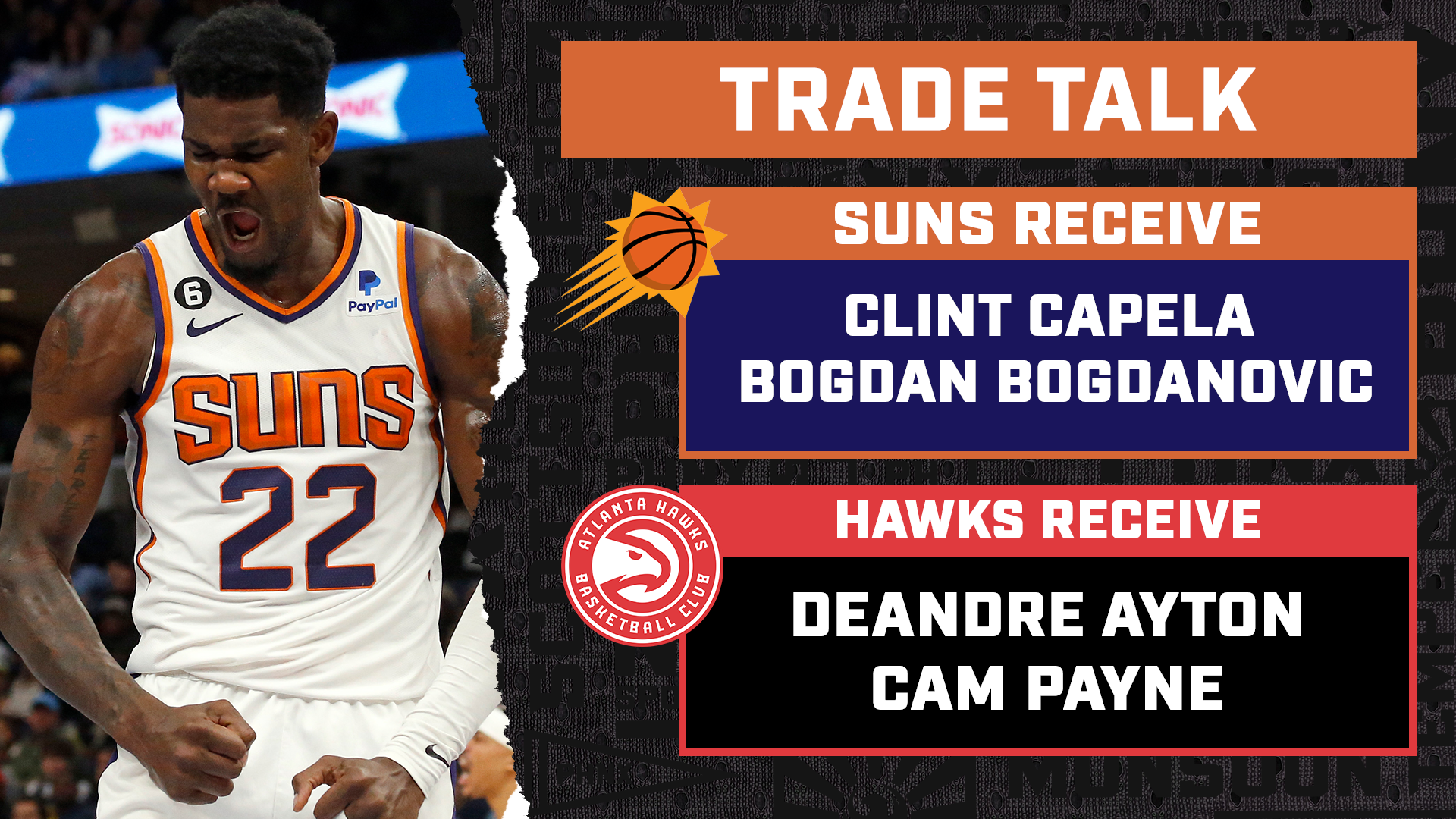
Indiana Pacers
The Pacers are the ones who signed Ayton to a max offer sheet in the first place last summer, and they still make sense as a trade suitor. A source told PHNX Sports that coach Rick Carlisle loves DA, and that Indy had a proposal of Myles Turner and Buddy Hield lined up for Ayton.
This type of package makes less sense now that the Suns added Beal, but Hield would still be an excellent bench scorer to plug in. The 30-year-old has averaged at least 15 points per game in each of the last five seasons, all while shooting 40.2 percent from deep for his career.
Aside from Hield, though, there’s a real case to be made that Turner is coming off a better season than DA. The 27-year-old tied Ayton in scoring at 18.0 points per game, and though DA clearly had the edge in the rebounding department (10.0 per game to Turner’s 7.5), Turner was a far better shot-blocker (2.3 per game) and 3-point shooter (37.3 percent on 4.0 attempts per game).
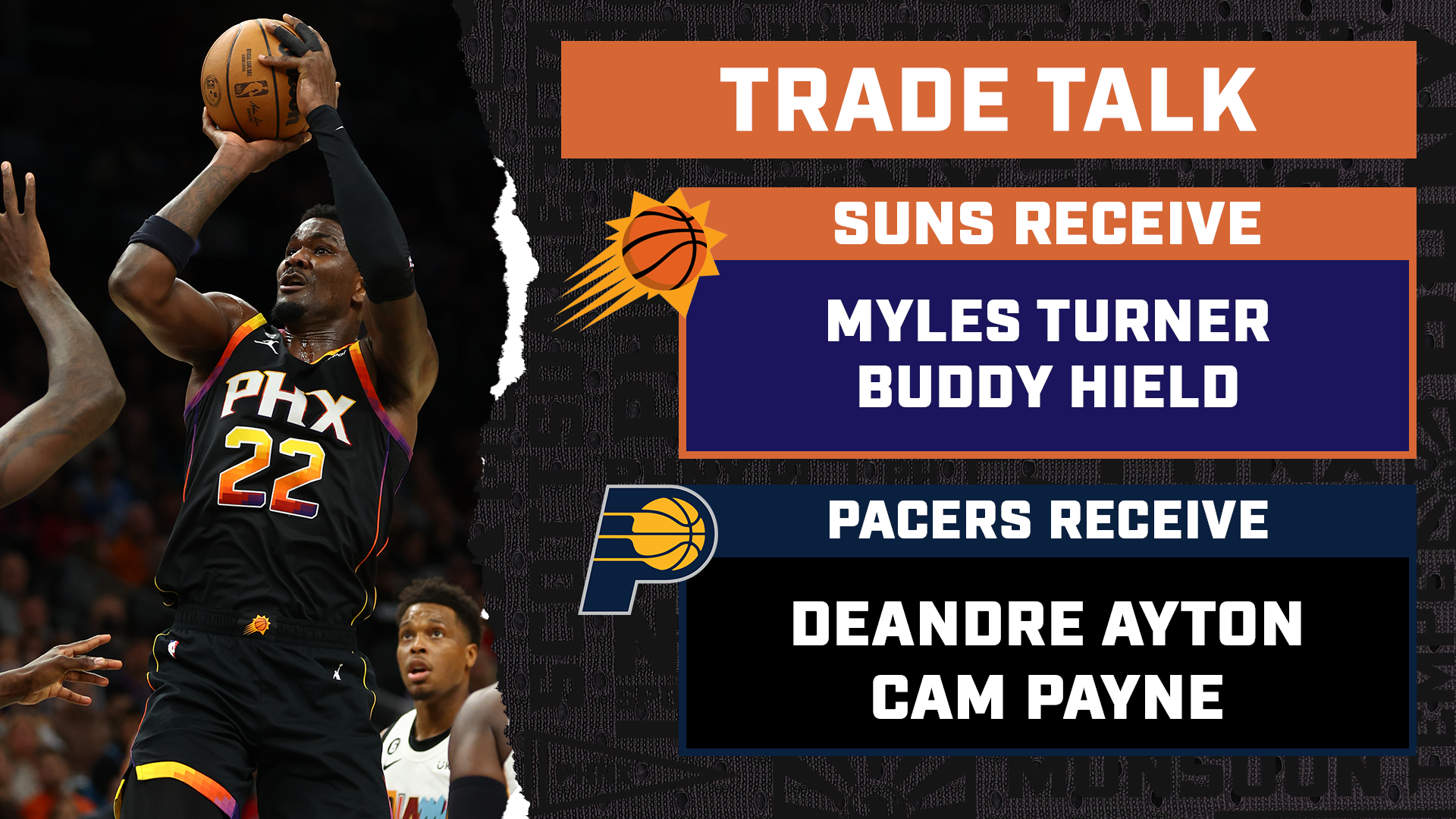
The Suns, however, were all about landing another point guard before the Beal trade and pushed for T.J. McConnell instead. Now that Chris Paul is gone and Cam Payne remains somewhat unreliable, a high-end backup like McConnell would still make a ton of sense.
McConnell has never been a double-digit scorer in a single NBA season, but he’s carved out a nice little eight-year career for himself by hounding opponents on defense and doing all the little things teams need out of a backup floor general. Last year in Indy, he averaged a respectable 8.7 points, 5.3 assists and 1.1 steals per game on tidy .543/.441/.853 shooting splits.
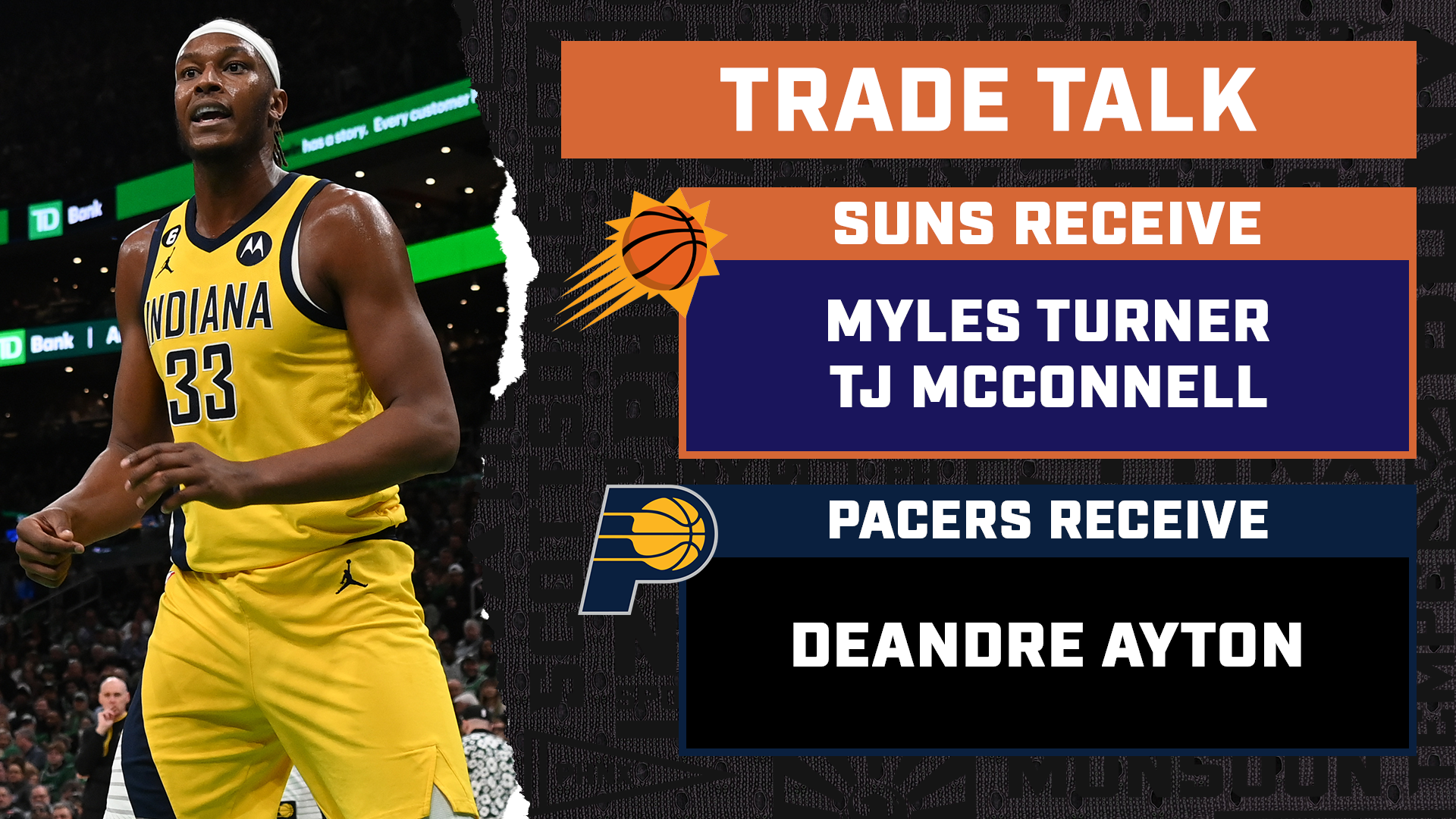
The question with both of these trades is just how interested Indiana remains in DA. Turner arguably had a better season and is signed to a more team-friendly extension that will pay him $40.9 million over the next two years. Ayton will earn $102 million over the next three years.
Whether it’s Hield or McConnell the Suns wind up targeting in such a scenario, it’d be hard to blame Indy for preferring to keep more manageable contracts on the books. Hield is a $19.3 million expiring deal, while McConnell is only owed $8.7 million next season and $9.3 million the following year (with only $5 million guaranteed for the last season).
However, Turner’s been on the trade block for years, and neither McConnell nor Turner fit with Indiana’s long-term plans. Until they’re definitively ruled out, the Pacers can’t be ignored in Deandre Ayton trade scenarios.
Golden State Warriors
We’ll keep this brief: The minute Draymond Green officially declines his player option, any lingering fantasies of him coming to Phoenix go out the window. He will reportedly do exactly that, which virtually eliminates the Suns.
The reason? Well, aside from Green and the Warriors being resolute on bringing him back, even if he wanted to come to Phoenix, it’d have to be through a sign-and-trade. That further complicates the math of sending Ayton’s $32.5 million salary to Golden State, and a sign-and-trade would hard-cap the Suns at $169 million. That means they couldn’t cross that line at any point. They’re already at $131 million between Booker, KD and Beal alone, without even factoring in Green’s new deal and salaries for the other 11 players on the roster.
In other words, the only possible avenue to this wacky but fun trade idea we’ve suggested in the past was for Green to opt into the $27.5 million left on the final year of his contract.
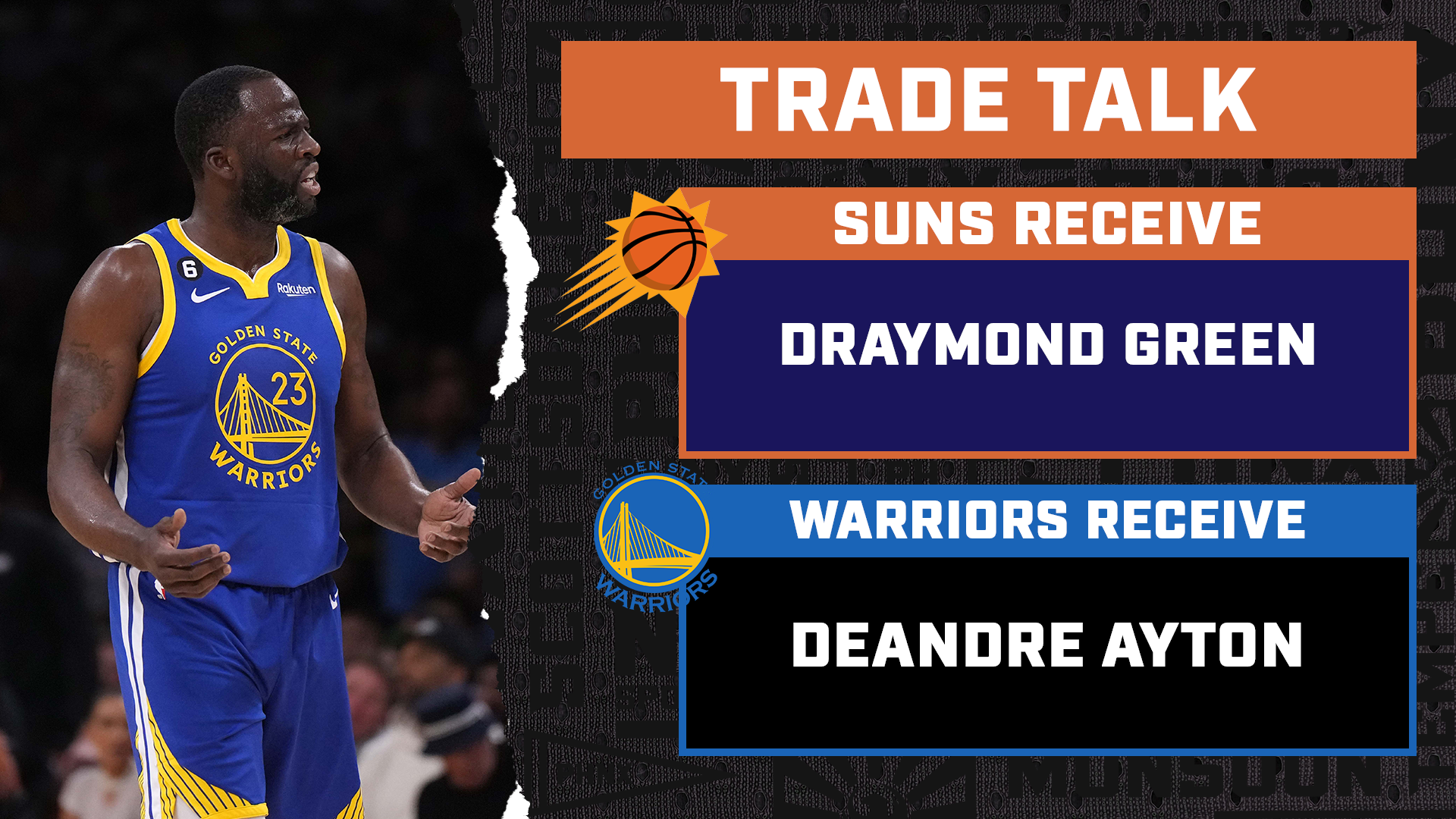
A one-for-one trade would work and slightly reduce Phoenix’s salary in that scenario, but that won’t be happening now.
Los Angeles Lakers
Do the Lakers really need a high-priced center? That’s debatable, since Anthony Davis at the 5 is still LA’s best path to success. But since everyone knows how Davis feels about playing center, and because we’re going all out on this Trade Machine Tuesday, we’re suggesting it anyway.
For the same reasons as Draymond Green, no one should root for a D’Angelo Russell sign-and-trade that would hard-cap Phoenix. Instead, the Suns set their sights on role players who got pinched from LA’s playoff rotation, as well as a first-round pick:
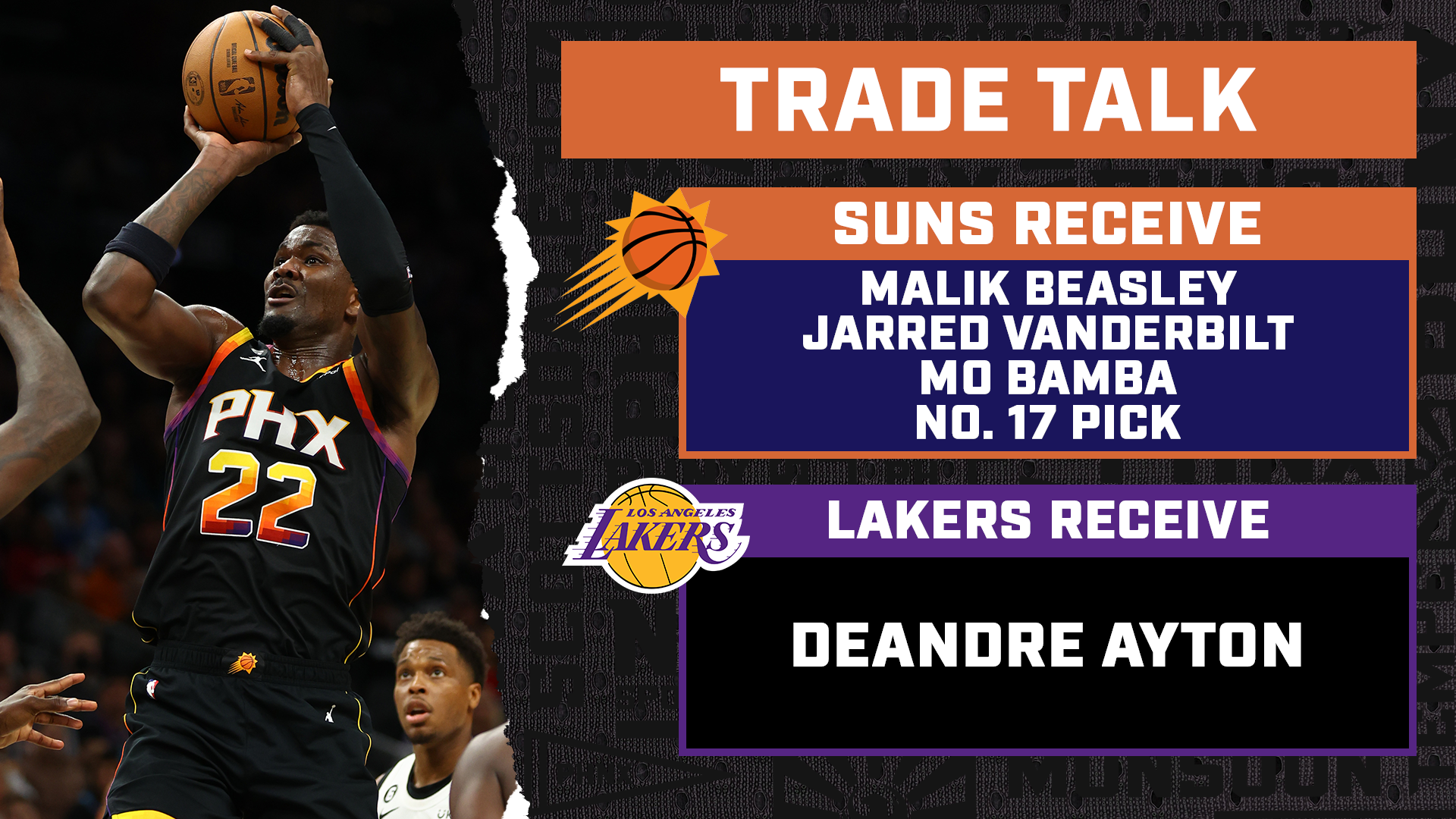
Malik Beasley’s defense would be a problem come playoff time, but he’s a capable bench gunner who’s a routine double-digit scorer and a career 37.8 percent shooter from downtown. He’s still only 26 and has a $16.5 million team option for the upcoming season before becoming an unrestricted free agent next summer.
Jarred Vanderbilt has been a recurring trade target on the PHNX Suns Podcast, and although his lack of offense led to dwindling minutes in the playoffs, his rebounding and multi-positional defense would be welcome, sorely-needed assets on the Suns. He’s still only 24 and his $4.7 million contract is one of the best bargains in the NBA.
Mo Bamba hasn’t amounted to much and hardly played for the Lakers, but he’s still only 25. The $10.3 million he’s owed is perfect for matching salaries in trades and could easily be flipped elsewhere. Finally, the 17th overall pick may be a stretch too far for the Lakers, but it’s worth the ask since the Suns are giving up their starting center for three players who didn’t crack LA’s playoff rotation.
Charlotte Hornets
Trading for Terry Rozier made a lot more sense before the Bradley Beal trade. Bringing him in to start would leave Phoenix a bit undersized in the starting backcourt, and trading DA for what amounts to an expensive backup point guard (without a surefire starting center joining him) would be a risky maneuver.
Rozier makes $48.1 million over the next two years, plus another $26.6 million in the third year (with $24.9 million guaranteed).
Still, a package built around Rozier, Cody Martin and two picks in this year’s draft would at least provide the Suns with multiple bodies on manageable salaries. The Hornets, meanwhile, would get an awesome pick-and-roll partner for LaMelo Ball to help get their rebuild off the ground.
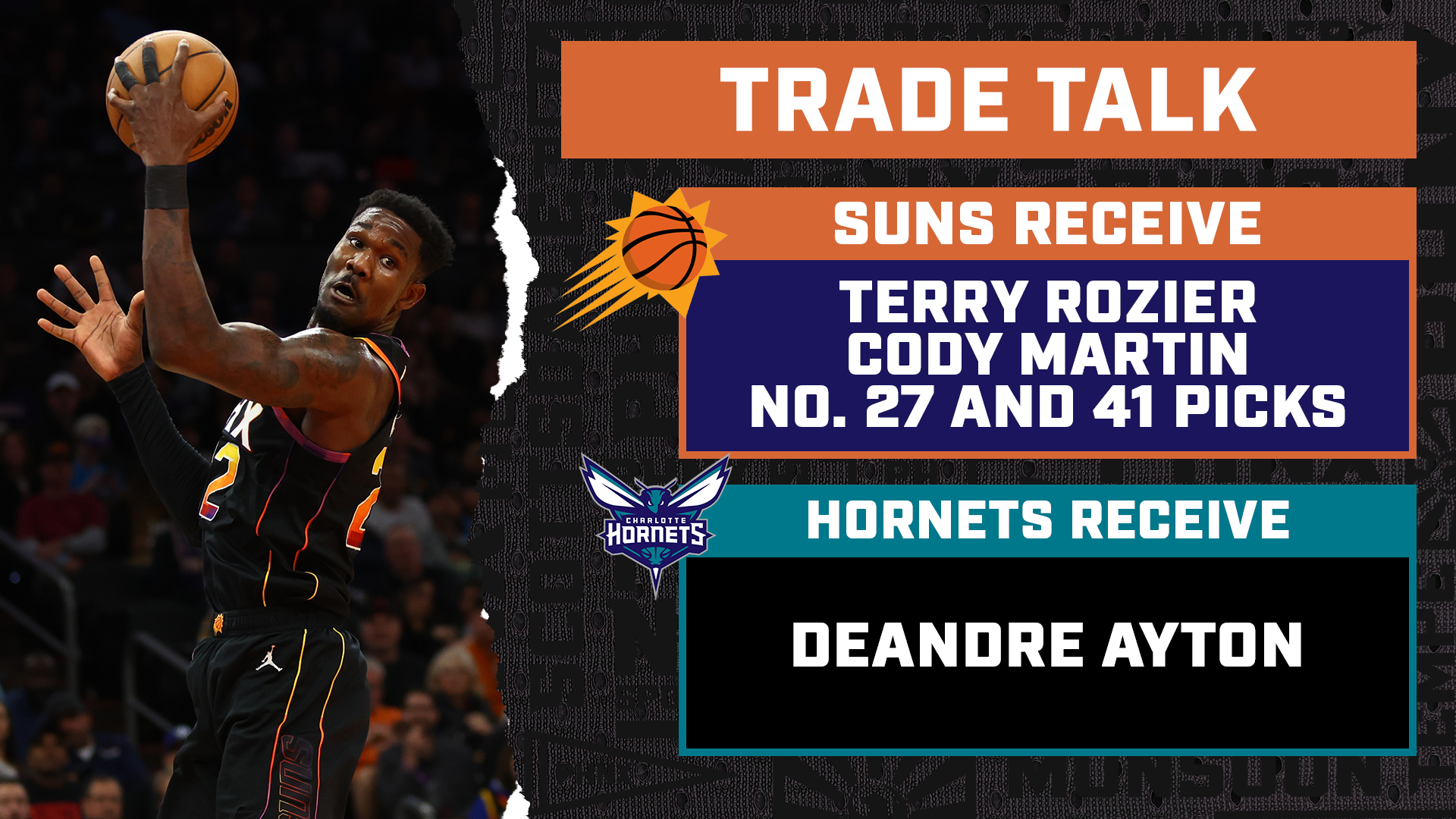
Charlotte is clearly getting the best player in this trade, but the Suns would be banking on Scary Terry taking what he learned as a leading option there and applying himself on a far better team, where he’d be expected to carry less of the offensive load.
Terry has averaged 19.7 points per game over his four years as a Hornet, and though he hasn’t been the most efficient scorer, he’s still made 37.3 percent of his 3s over that stretch. Vogel could tap back into the point-of-attack defense that put him on the map in Boston, so even if he’s not much of a facilitator, perhaps a reduced offensive role and more of a defensive focus would help him shine as a high-end role player.
Caleb Martin got all the attention during the Miami Heat’s run to the Finals, but his twin brother Cody Martin is no slouch either. He only played seven games last season due to knee surgery, but the year before that, he posted a well-rounded 7.7 points, 4.0 rebounds, 2.5 assists and 1.2 steals in just 26.3 minutes per game, all while shooting 48.2 percent overall and 38.4 percent from 3. At 6-foot-6, he fits the two-way wing archetype Phoenix needs.
If the Suns feel the need to bring back a center, they could drop Martin and the 41st overall pick to target Mark Williams instead.
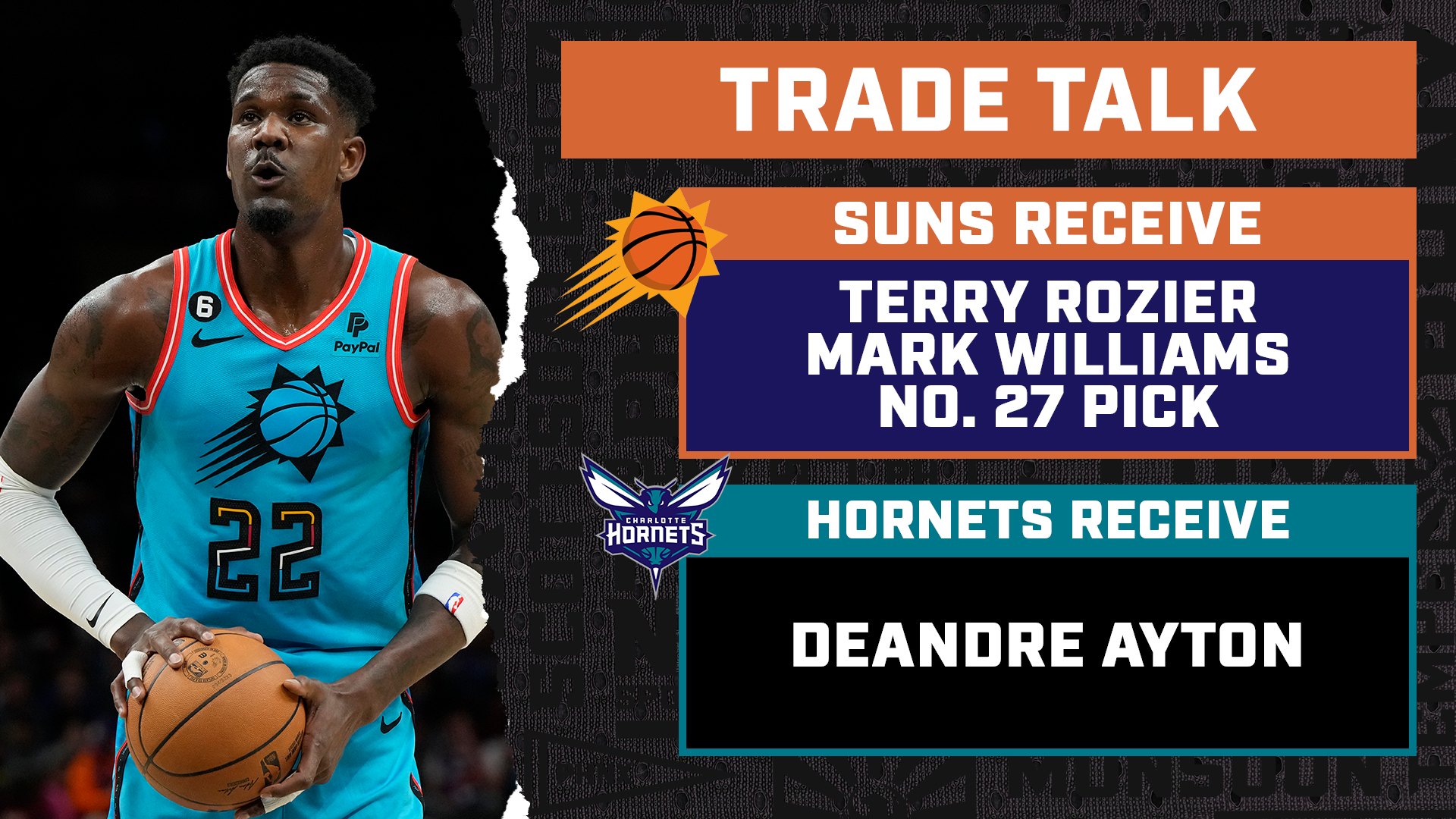
Williams is not a name many people outside of Charlotte know, but he quietly put together an impressive rookie year, averaging 9.0 points, 7.1 rebounds and 1.0 blocks in just 19.3 minutes per game. He shot 63.7 percent from the floor, and while he’s still a developing young player, the 21-year-old can definitely contribute on the stat sheet. Being under team control for $3.9 million, $4.1 million and $6.3 million over the next three years is a major bonus.
However, even for the biggest Rozier believers, his contract is a bit pricy for what he provides. This move doesn’t necessarily put the Suns in a better position to contend for a title either. Phoenix would still need a starting center, unless the front office really believed in Williams, Jock Landale or Bismack Biyombo to hold it down.
Boston Celtics
This might be the most optimistic trade of the bunch, since it hinges on the Celtics being so disappointed with their Eastern Conference Finals loss that they decide to clear out some of that backcourt logjam.
Malcolm Brogdon may have put up 14.9 points, 4.2 rebounds and 3.7 assists per game on .484/.444/.870 shooting splits en route to Sixth Man of the Year honors, but he feels like the most likely trade candidate in Boston. If he’s available, the Suns should at least pick up the phone with this type of offer:
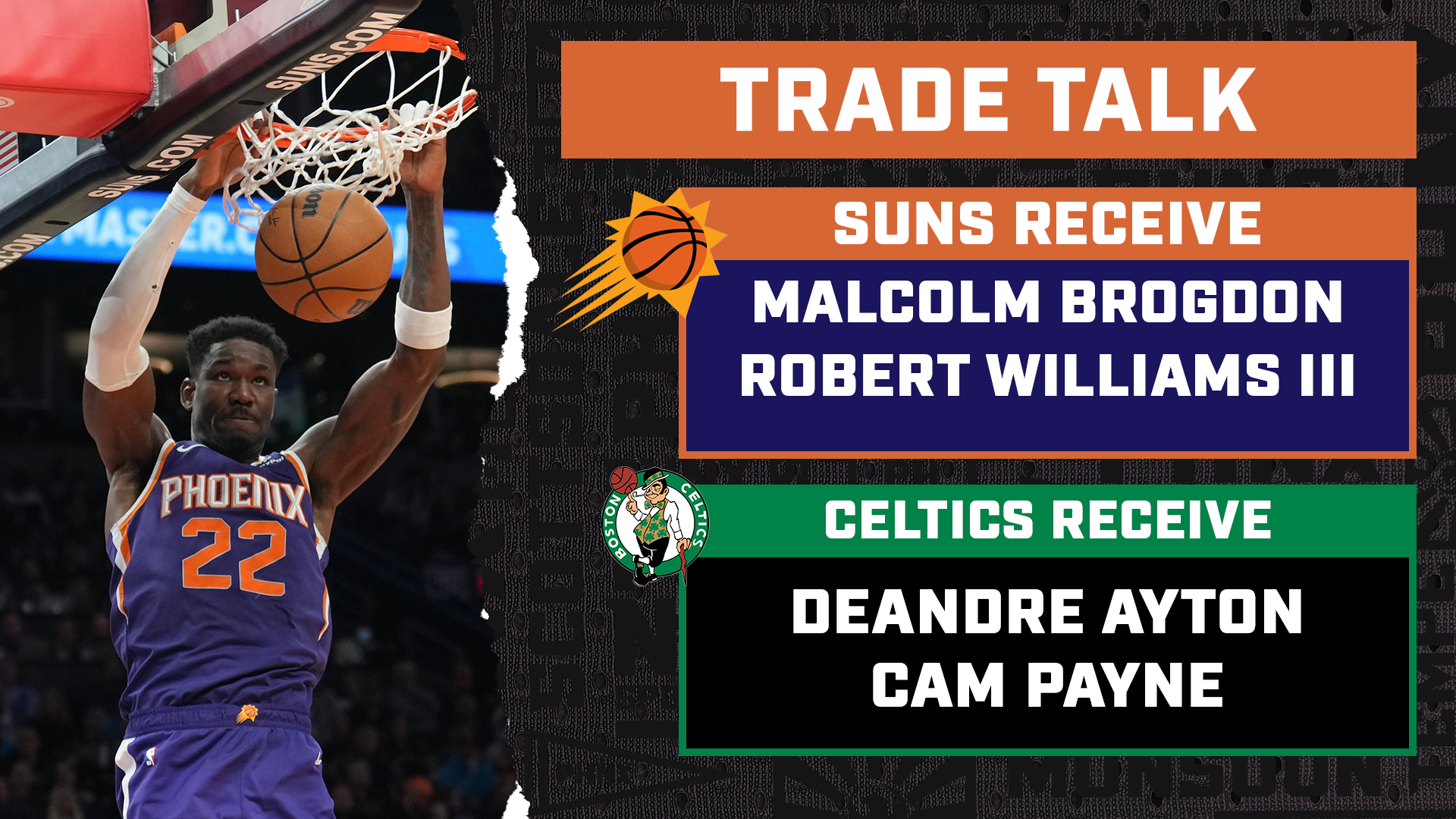
Brogdon has been a double-digit scorer every season of his career and has long made sense as a Suns trade target. He’s 30 years old and makes $45 million over the next two years, but he’s also an efficient shooter who can run offense as the lead guard or play off the ball as a combo guard. Even if the Suns didn’t task him with the starting point guard job, he’d be perfect for staggering with the stars and second unit alike.
Snagging an elite shot-blocker like Robert Williams III and pairing him with Vogel would be the icing on the cake. DA is the better all-around center, but Time Lord’s been a rim-protecting fiend whenever he’s been on the court. His offensive repertoire is extremely limited, but he’s an efficient finisher around the rim, shooting 70 percent from the field or better in all five of his NBA seasons. He’s still only 25 and earns an average salary of $12.4 million over the next three years.
The Celtics would trade their backup guard for another backup guard in Payne, and although they’d be downgrading there, Ayton would be a more versatile and durable weapon for their offense in the pick-and-roll.
However, the problem with this swap is Williams is barely available. Due to injury, he’s missed 50, 43, 20, 21 and 47 games in each season since he entered the pros. That’s nowhere near reliable enough for a team with title aspirations. So even though Al Horford is 37 years old, he’s been more dependable over the last two years:
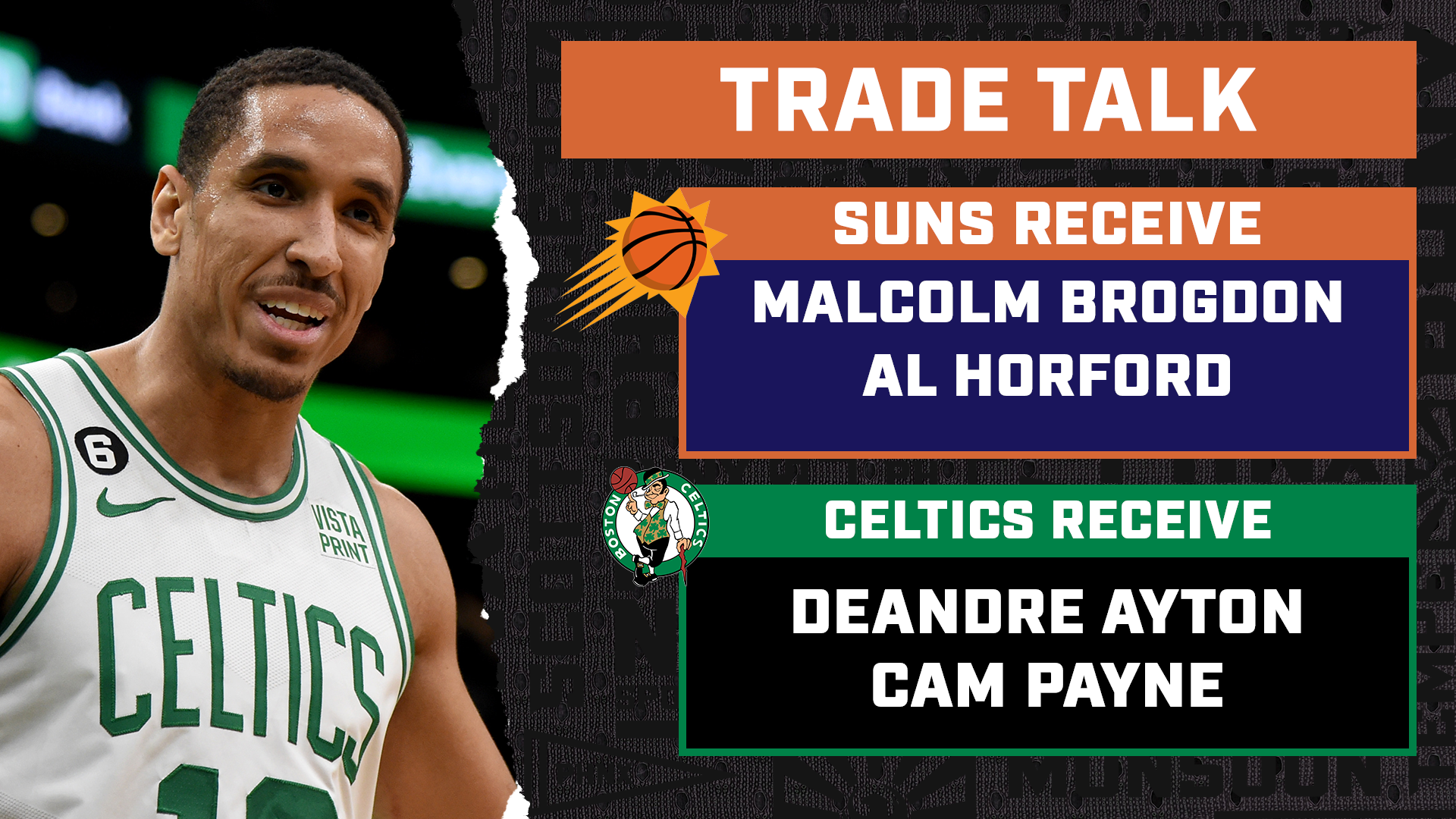
Horford missed 19 games this season and 13 games the year before, but he’s been a versatile playoff weapon on both ends for Boston. His pick-and-roll defense on the perimeter is a step slower these days, but he still finds ways to affect the game as an interior defender and improved 3-point shooter (44.6 percent on 5.2 attempts per game last year).
Starting him at center for a full season feels like a stretch, but come playoff time, he’s the type of high-I.Q. big the Suns would love to have on both ends. Even better, he only makes $10 million next season and $9.5 million the following year, so even if he got hurt, his contract would still be movable.
The question is whether Boston is even in the market for a different look at center. Ayton is more durable than Williams and Horford, and he has more upside, but it remains to be seen how proactive the Celtics will be after missing out on a trip to the Finals. The massive contracts they’ve got coming for Jayson Tatum and Jaylen Brown may also give them pause about absorbing Ayton’s $32.5 million salary.
Cleveland Cavaliers
Is now the time to cash in on the Cavaliers’ disappointing first-round playoff exit? If so, Jarrett Allen would be an excellent get.
A year removed from his first All-Star season, Allen’s numbers slightly declined in almost every category. The 25-year-old center still put up 14.3 points, 9.8 rebounds and 1.2 blocks per game on 64.6 percent shooting, but those marks were all down from the season before. The allure here is pairing Allen’s athleticism and shot-blocking instincts with Vogel, the rim protector whisperer, as well as going from a $32 million center to a $20 million center for the next three seasons.
If Allen’s available, or the Cavs are looking to add another major piece to help shake off that playoff flameout, DA might make some sense as a new pick-and-roll partner for Darius Garland and Donovan Mitchell:
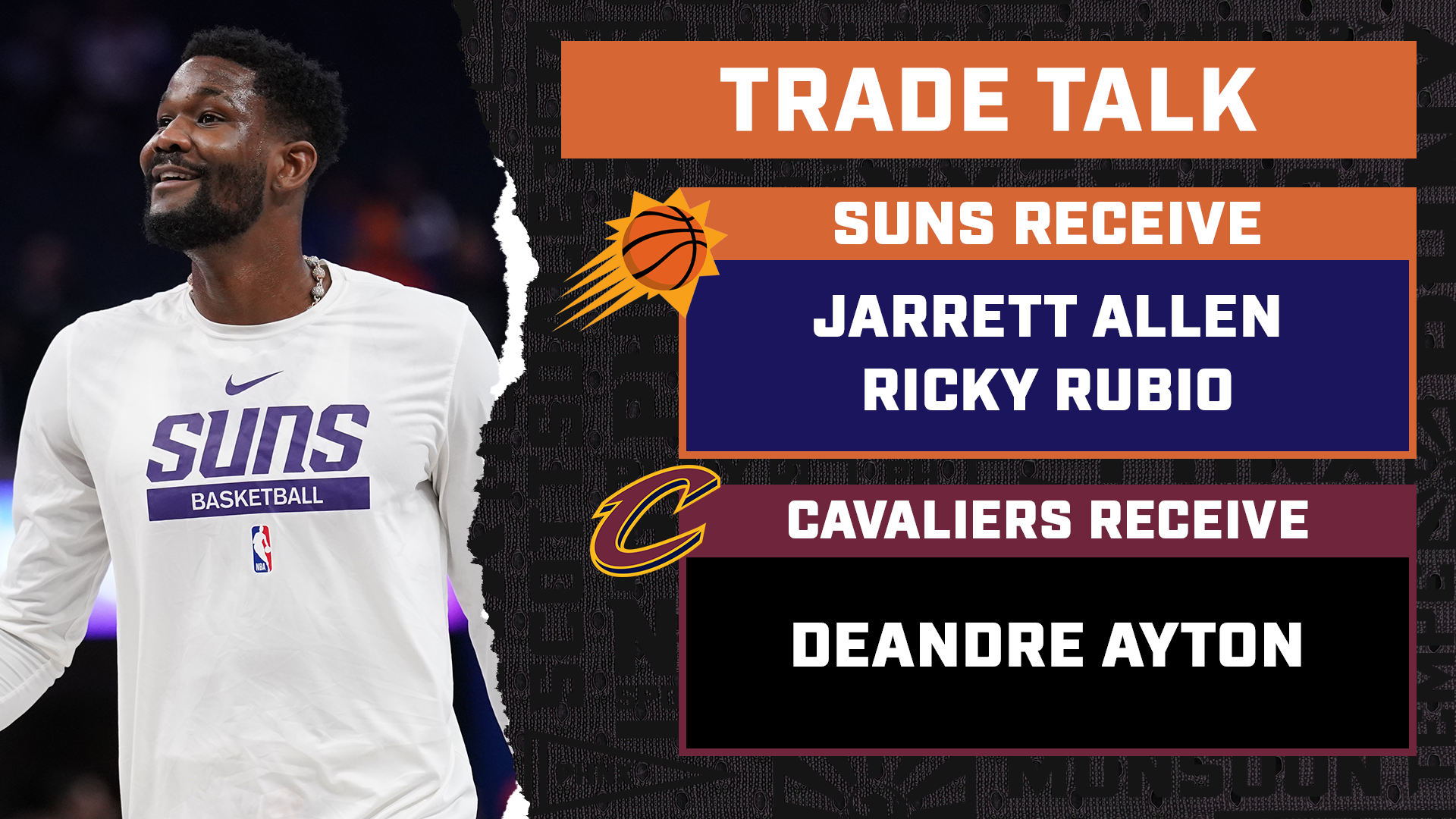
Ricky Rubio looked like a shell of his former self last season, but that may have been due to the knee injury he was returning from. Injuries have long been a concern with Rubio, but he’d only be the backup floor general in Phoenix. Perhaps with a full offseason to prepare, he’d be rejuvenated back in the Valley. He also only makes $6.1 million next year and $6.4 million the year after that.
However, youth is on the Cavs’ side, so perhaps the front office will remain patient with the young core before shaking things up this drastically. Rubio’s availability remains a concern, and there are better Deandre Ayton trades out there for both parties.
New York Knicks
Defensively, Mitchell Robinson fits the exact mold of big man Vogel needs. In just 26.9 minutes per game last season, Robinson put up 7.9 points, 9.4 rebounds and 1.8 blocks per game. He also recorded 109 blocks to Ayton’s 53, despite playing 444 fewer minutes.
Like Time Lord in Boston, Robinson has little offensive game to speak of outside of rim-running and alley-oop lobs. He was highly efficient as a finisher in the paint, though, shooting 67.1 percent from the floor.
Robinson is only 25 and makes an average of $14.3 million over the next three years — about $20 million less than DA. That’s the type of contract that can easily be used in future trades, and Robinson’s declining salary makes him even more attractive as a trade asset.
Throw in a quality role player like Josh Hart (who would have to opt into his $12.9 million player option) and suddenly this trade gets a whole lot sweeter:
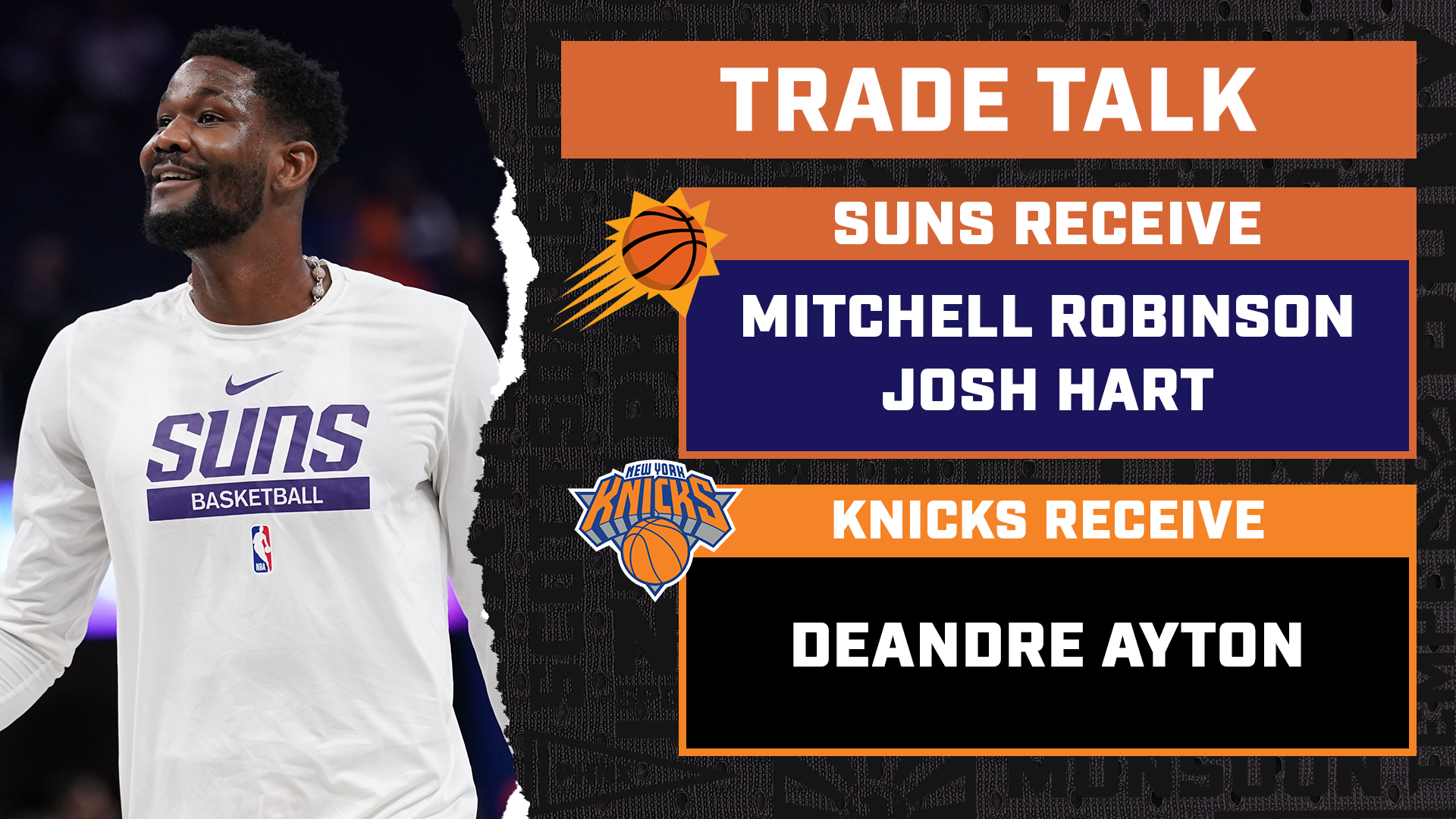
However, that last part is a big ask. Hart is expected to decline his $13 million player option to become a free agent, and he’s expected to return to New York. It’s easy to see why they want him back, since he put up 10.2 points and 7.0 rebounds on blistering .586/.519/.789 shooting splits in his 25 games for the Knicks.
So as much as his 3-and-D skill-set (and great rebounding for a 6-foot-4 guard!) would be a perfect match for the Suns, don’t count on it materializing. Bearing that dis-Hart-ening news in mind, a more realistic option is something like this:
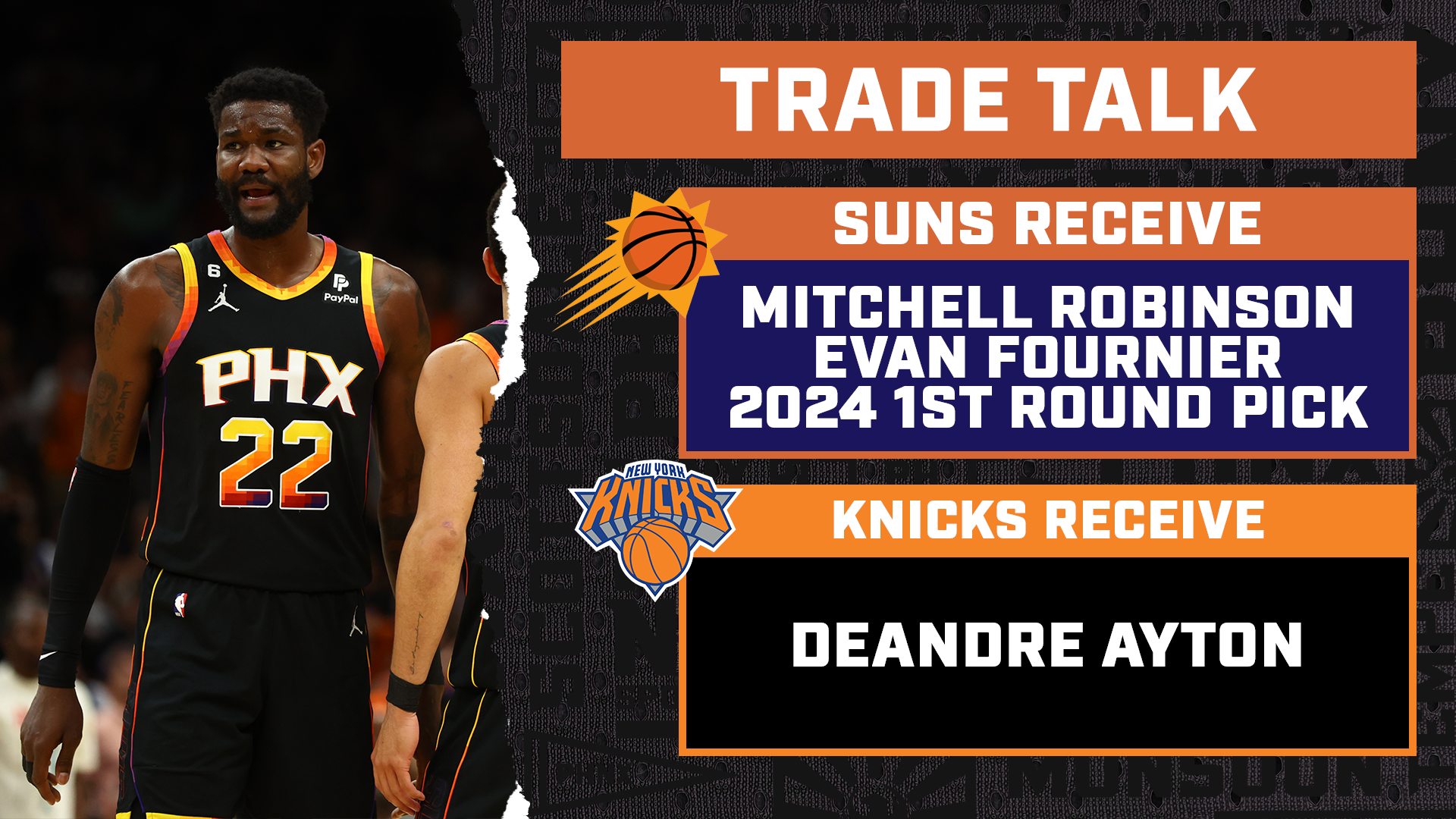
He-Who-Must-Not-Be-Googled has never had lower value, appearing in just 27 games for the 4-seeded Knicks. However, Evan Fournier is also a career 37.9 percent 3-point shooter on decent volume, and until last year, he had averaged between 14-19 points per game in each of his last seven seasons. In terms of being able to shoot and get his own bucket, the 30-year-old Fournier could simply need a change of scenery.
Fournier makes $18.9 million next season — perfect for flipping elsewhere as a pseudo-expiring deal, since his $19 million for 2024-25 is a team option. Robinson and Fournier are a bit of an underwhelming return, so after the Knicks (likely) turn down overtures for Immanuel Quickley and Quintin Grimes, they give Ishbia another first-round pick to play with, most likely in another aggressive trade down the line.
Brooklyn Nets
Who’s ready to reunite the Twins in Brooklyn with their triplet?
Ayton would immediately inject youth, energy and interior scoring into a fun group of Nets youngsters. He already has familiarity playing with Mikal Bridges and Cam Johnson, and right now nobody feels off-limits in Brooklyn.
From the Suns’ perspective, any DA trade conversations with Brooklyn would almost have to inquire about Nic Claxton, a defensive specialist who can protect the rim and even switch out onto the perimeter. His versatility would be an ideal fit in Vogel’s system, and given how unsteady Joe Harris has looked since returning from injury, Brooklyn might be perfectly fine with cutting him loose:
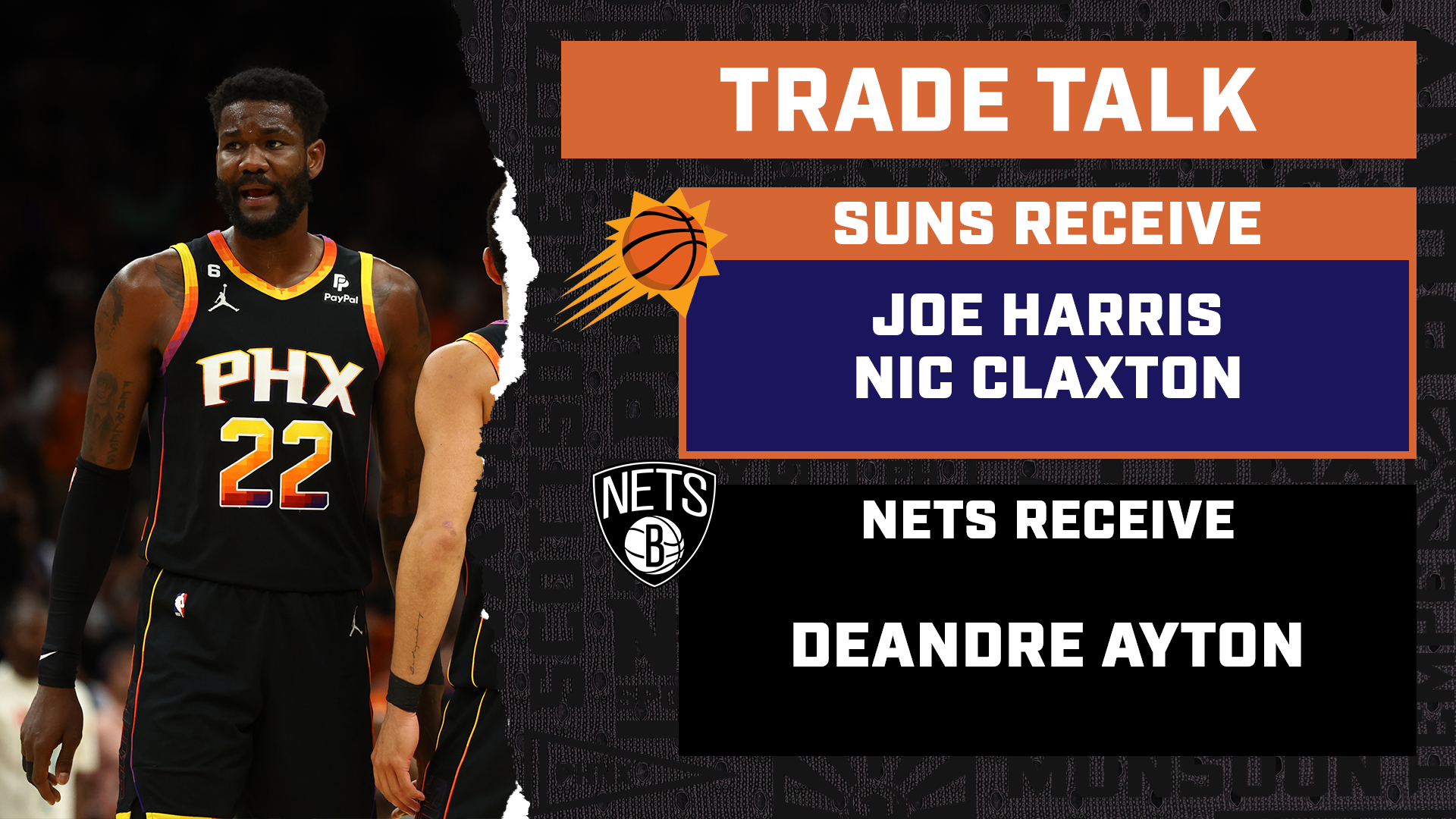
Like many of the bigs on this list, Claxton is more limited offensively, but he’s efficient inside the paint, shooting 70.5 percent overall last season. He also just averaged 2.5 blocks per game before his 24th birthday, and he only makes $9.3 million this upcoming season.
Harris, meanwhile, is another expiring contract, albeit a more expensive one at $19.9 million. That type of salary could be flipped elsewhere at the trade deadline, especially if his putrid 15.4 percent shooting in the playoffs — including 8.3 percent from 3! — carried over into the season.
Granted, that was only four games, but Harris may not be as reliable as he once was coming off multiple ankle surgeries. He still shot 42.6 percent from deep during the regular season, but it came on fewer attempts than he averaged in the past, since he was only logging 20.6 minutes a night.
If the Suns want to get greedy, they can veer right around Harris’ expiring deal and target another high-end defender in Dorian Finney-Smith, as well as a veteran backup guard in Patty Mills:
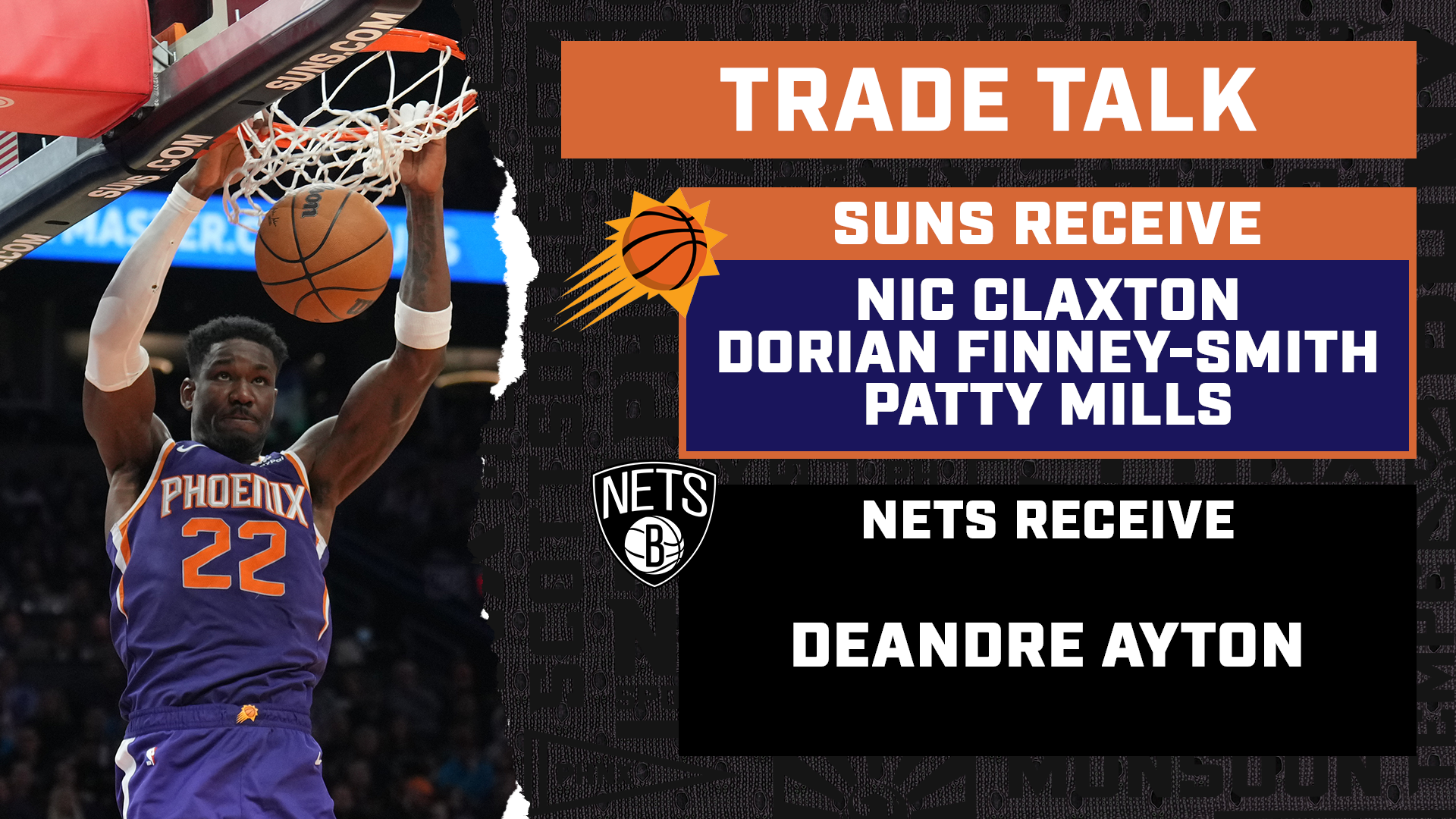
This is probably a bit steep for Brooklyn. The Nets didn’t want Ayton in their Kevin Durant trade talks, so there’s a very good chance they’d prefer to keep Claxton and let him develop into a routine Defensive Player of the Year candidate.
Still, it never hurts to ask, and the reward here would be the ideal defensive pair to put in Vogel’s rotation. Finney-Smith is a highly underrated wing defender who can guard multiple positions and still (hopefully) keep defenses honest. He only shot 33.7 percent from deep last year, but in his three seasons prior in Dallas, he shot 39.5, 39.4 and 37.6 percent from 3. He’s only got two years and $28.9 million left on his contract, plus a $15.4 million player option for the third year.
Assuming Claxton is off-limits, the Suns could counter with something like this:
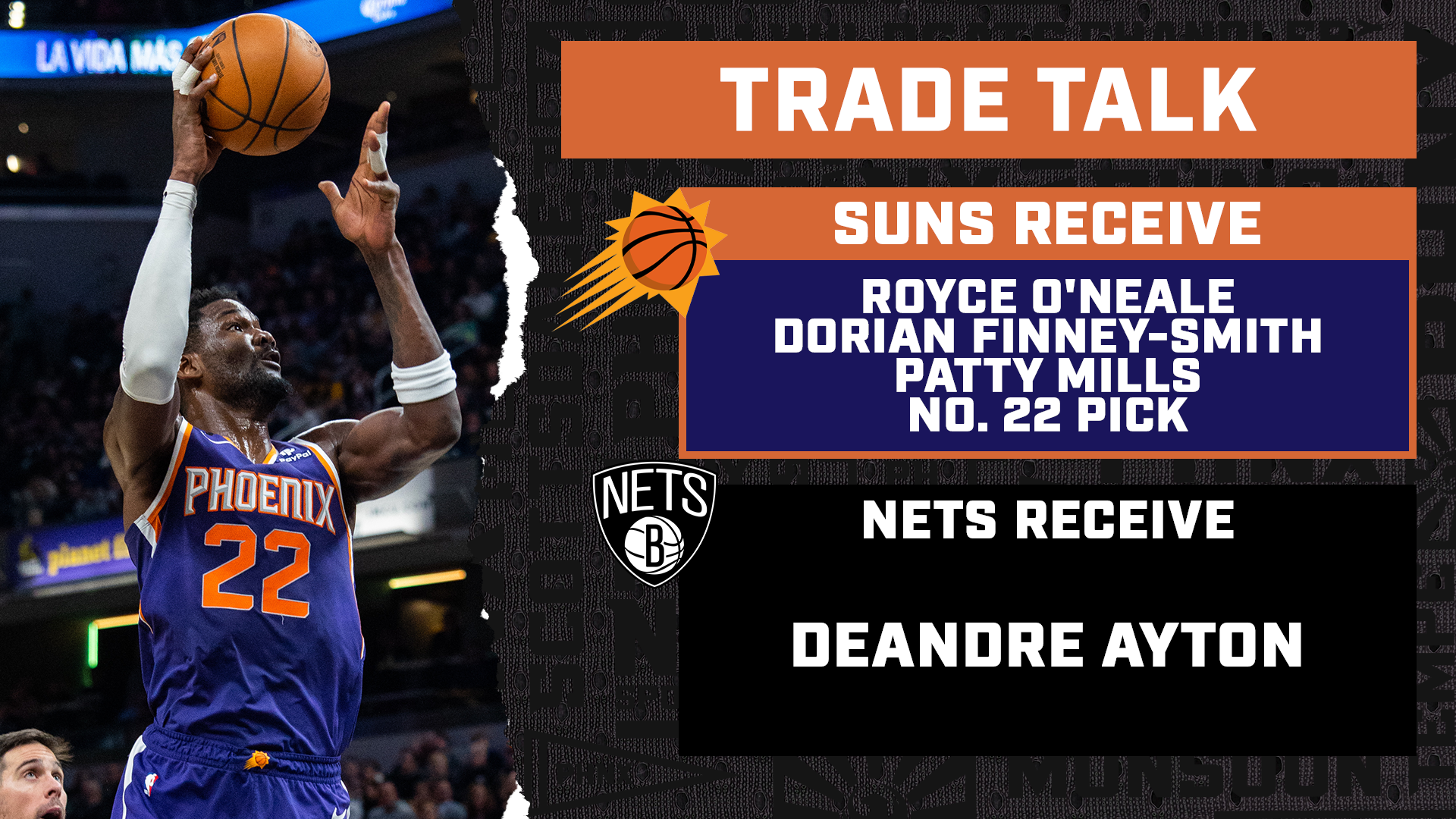
Finney-Smith and Royce O’Neale are the type of 3-and-D wings the Suns could easily plug-and-play with their stars or bench unit. O’Neale has made at least 37 percent of his 3s in each of the last five seasons and only makes $9.5 million next season. Only $2.5 million of his salary is guaranteed, so the Suns would need to increase that guarantee to make the math work.
Mills, meanwhile, deserves to be on a contender again after proving his mettle as an NBA champion with the Spurs. He’d give Jock Landale another Aussie in the locker room, he’s a career 38.9 percent shooter from 3, and he only makes $6.8 million next season. Throw in the No. 22 pick to make up for the lack of a surefire trade chip, and this feels like a fair exchange.
However, like we mentioned, the Nets didn’t want DA in their trade negotiations before. Claxton is arguably the more attractive prospect for Brooklyn because of his cheaper contract and defensive ceiling, and in our second trade scenario, the Nets are suddenly left with both Claxton and DA at center, which wouldn’t make much sense unless one was immediately flipped elsewhere.
Memphis Grizzlies
This is one of the more underrated options, but the Grizzlies could use some help (and some youth) at center next season as they prepare for 25 games without Ja Morant. The Suns could use some physical toughness and rebounding at center, as well as some help at the 1.
This trade, swapping DA for Steven Adams, Tyus Jones, Santi Aldama and the No. 25 overall pick, checks a lot of boxes.
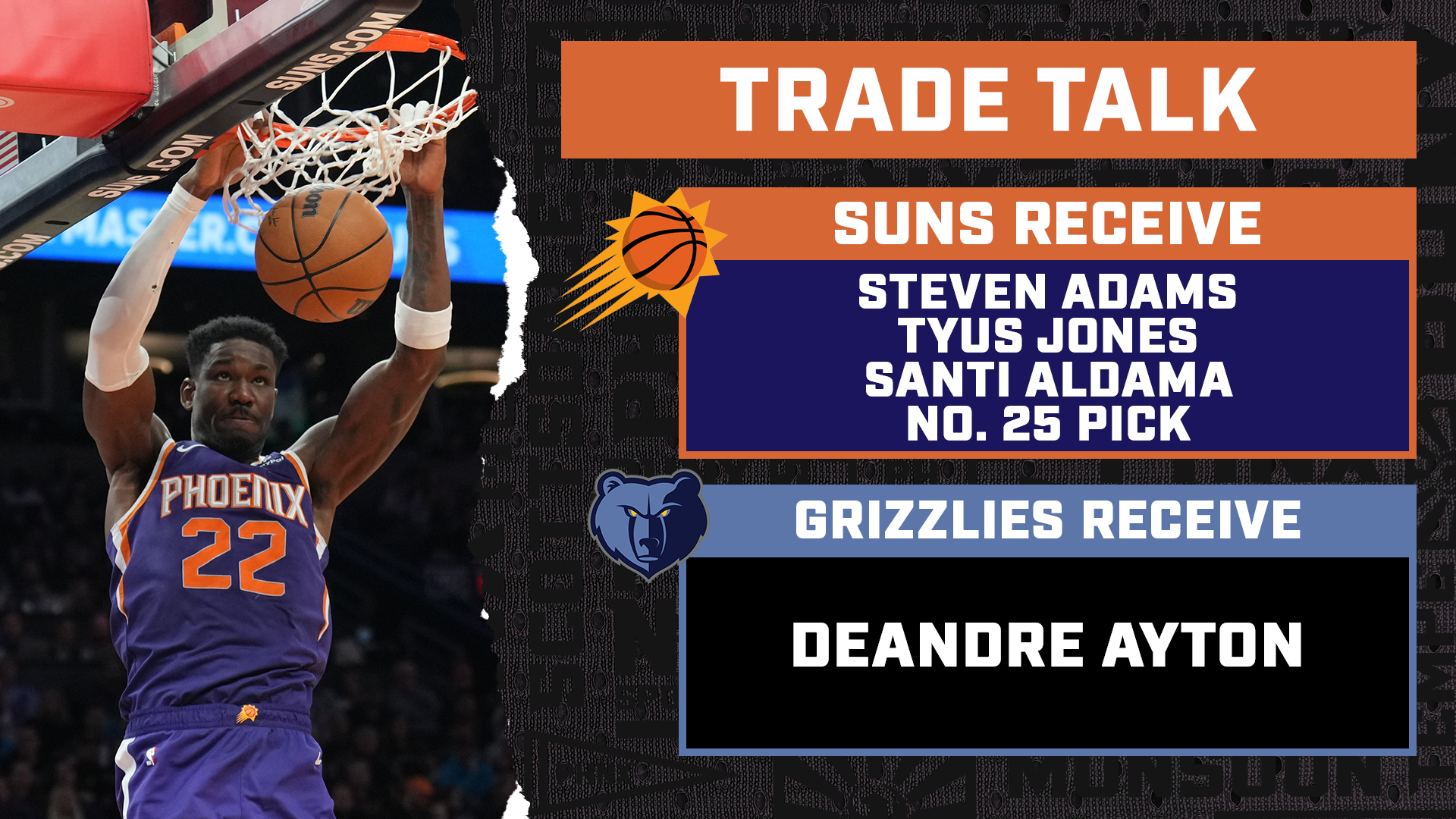
Is it typically bad form to trade a starter to another Western Conference power? Sure. But the Grizzlies feel a lot tamer than they did a year ago, and the Suns have more than enough talent to beat this Memphis team in a seven-game series if they met in the playoffs.
To that end, Adams is a brick house with legs who sets some of the sturdiest screens in the league. That’s a pretty attractive trait for a team with scorers like Booker, Beal and Durant, as is his rebounding (11.5 per game last year). Adams is also an underrated passer, and his $25.2 million over the next two seasons is less than Ayton’s salary for next season alone.
Tyus Jones, meanwhile, either gets his chance to prove himself as a starting-caliber point guard or continues to kill it off the bench as one of the NBA’s best backups. He’s coming off a season where he posted a career-high 10.3 points and 5.2 assists in just 24.2 minutes per game, all while shooting 37.1 percent from beyond the arc.
Jones is still only 27 and playing on a $14 million expiring contract. Re-signing him in free agency next summer may prove to be a trickier endeavor, but even a one-year rental could pay dividends if Phoenix amasses enough depth to win a title.
As for Santi Aldama, the 6-foot-11 stretch-big had a quietly productive second season in the NBA. The 22-year-old only shot 35.3 percent from deep, but he still put up 9.0 points and 4.8 rebounds in his 21.8 minutes per game. He’s the type of flier the Suns should be taking if they can convince Memphis to include him and the No. 25 pick in the draft.
If that’s too steep, the Suns could always try countering with No. 45 instead, or swap in John Konchar for Aldama.
Portland Trail Blazers
Nobody knows what the Portland Trail Blazers are going to do. Damian Lillard and the Portland Trail Blazers can profess their undying love for each other until they’re black, white and red in the face, but no one’s going to believe it until that front office proves it can finally do right by its franchise player.
Ayton’s been connected to the Blazers in the recent past, and Anfernee Simons is their most attractive trade chip. Is it really as simple as Ant and Nassir Little to match salaries?
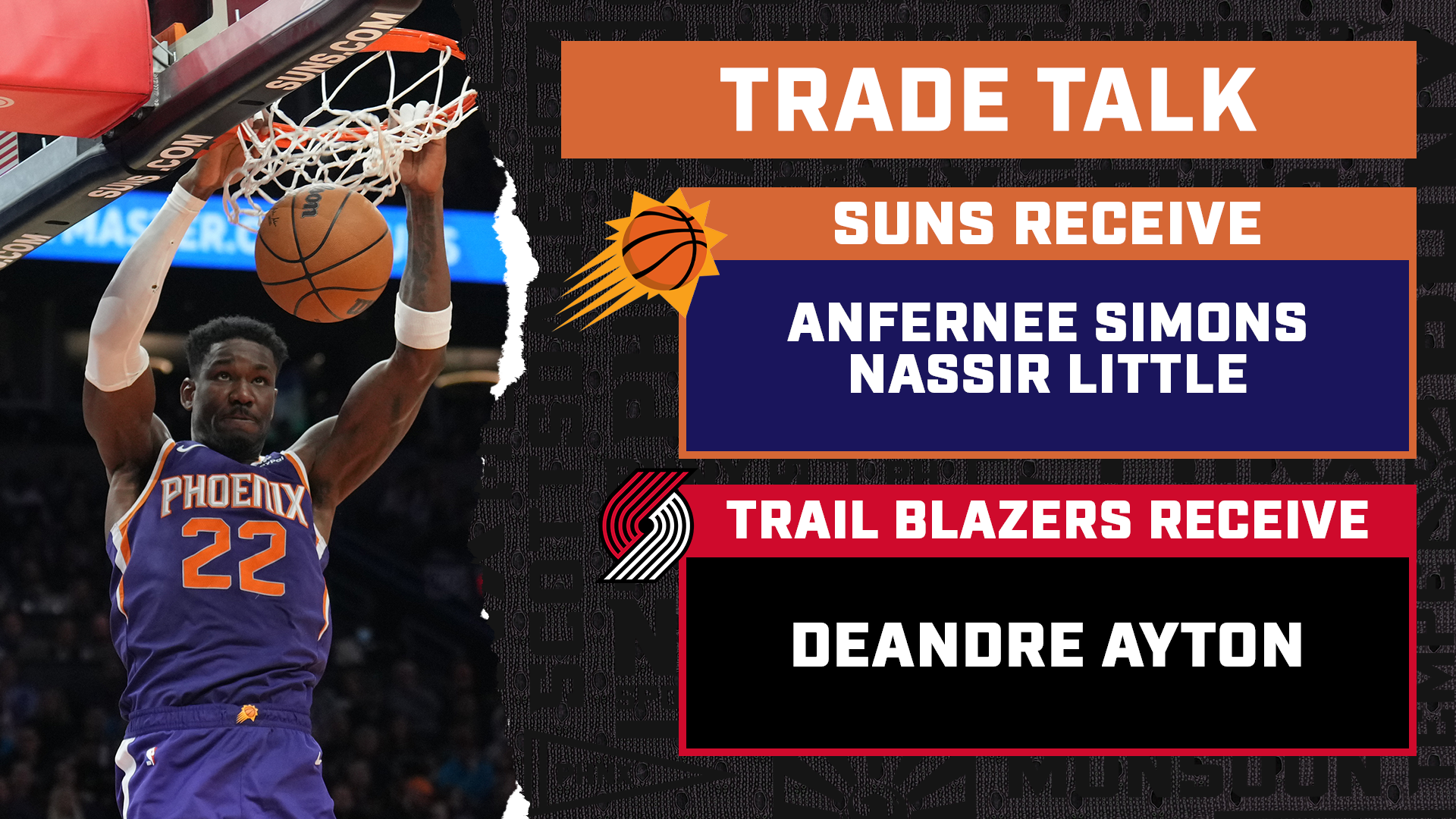
In all likelihood, probably not. This would be an intriguing return for the Suns because of Simons’ scoring potential, since the 24-year-old just averaged a career-best 21.1 points per game. But the Suns are already overstocked with scoring at the 2-spot between Booker and Beal. What they really need is more defense, and as much as Little and his extremely team-friendly contract have potential, he’s still largely unpolished.
This is also a less-than-ideal use of assets for Portland. They’d still have to unload Jusuf Nurkic somewhere, and their No. 3 pick — alongside Simons and Little — is probably their best trade asset. Ayton’s not worth that No. 3 pick alone, so until the Blazers sort that situation out, it would make sense to hold onto all their other assets to maintain flexibility for a bigger, blockbuster move.
San Antonio Spurs
The Spurs won the Victor Wembanyama Sweepstakes, because of course they did. But apparently they’re playing around with the idea of adding a more burly center to spare Wemby from the physical toll of banging bodies in the paint against grown men all season. To that end, Ayton might make sense here.
Every Suns fan’s nightmare would be watching DA suddenly turn into David Robinson under Gregg Popovich, but at this point, it’s safe to say that’s just not in his game, regardless of system. So if San Antonio is truly interested, they have the cap space to absorb his contract outright.
The trade math is irrelevant here, so the Suns can hold firm on the only prerequisite that would matter in such a trade: Phoenix gets Keldon Johnson, additional bodies to help round out the roster, and maybe a future pick of some sort.
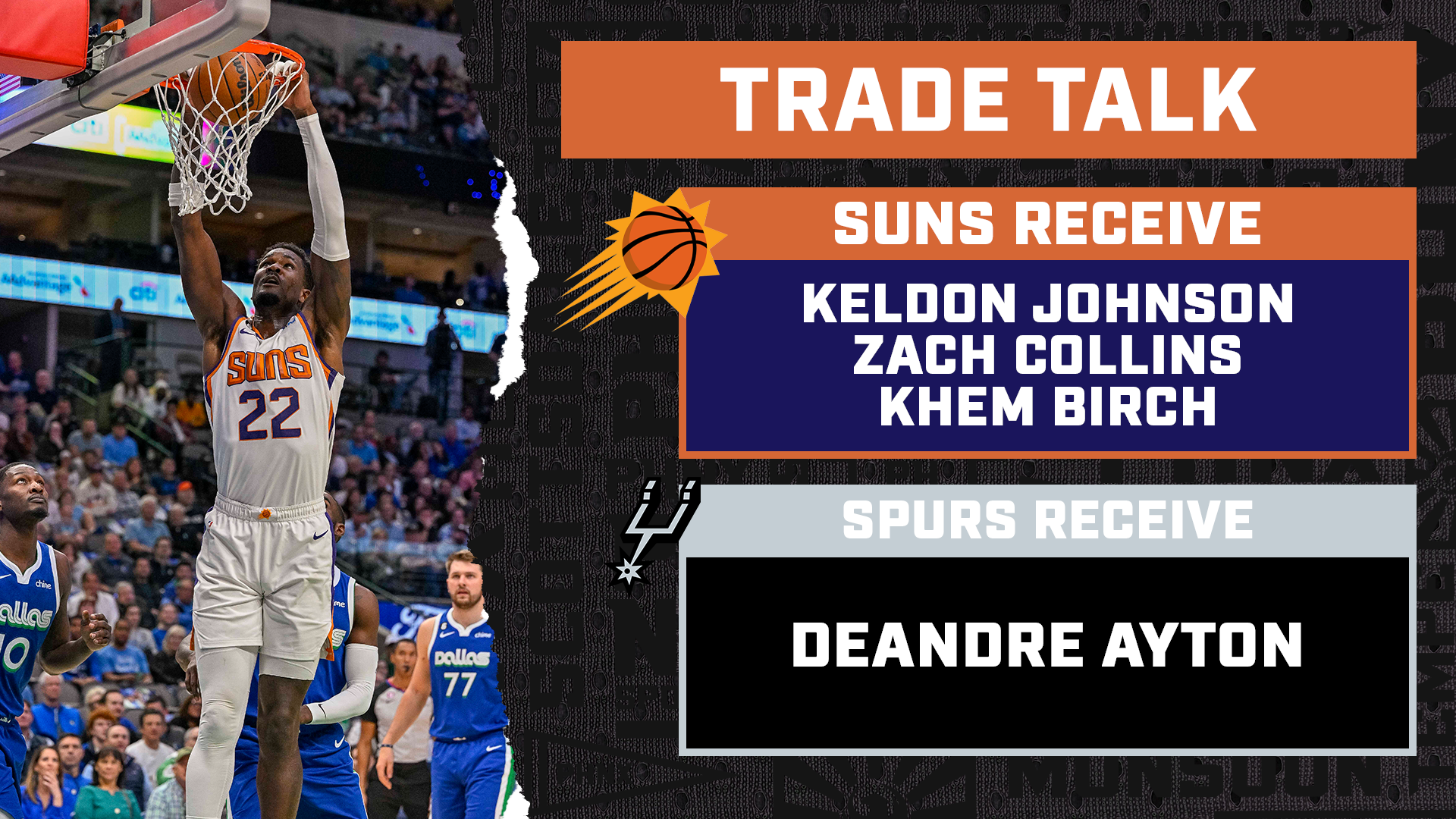
It doesn’t really matter what direction the Suns lean at this point. If they want size, they could ask for Khem Birch or Zach Collins. If they value shooting, Doug McDermott and his expiring $13.8 million salary are right there.
And if they need another option at point guard, Devonte’ Graham and the remaining two years and $24.8 million on his contract feel attainable.
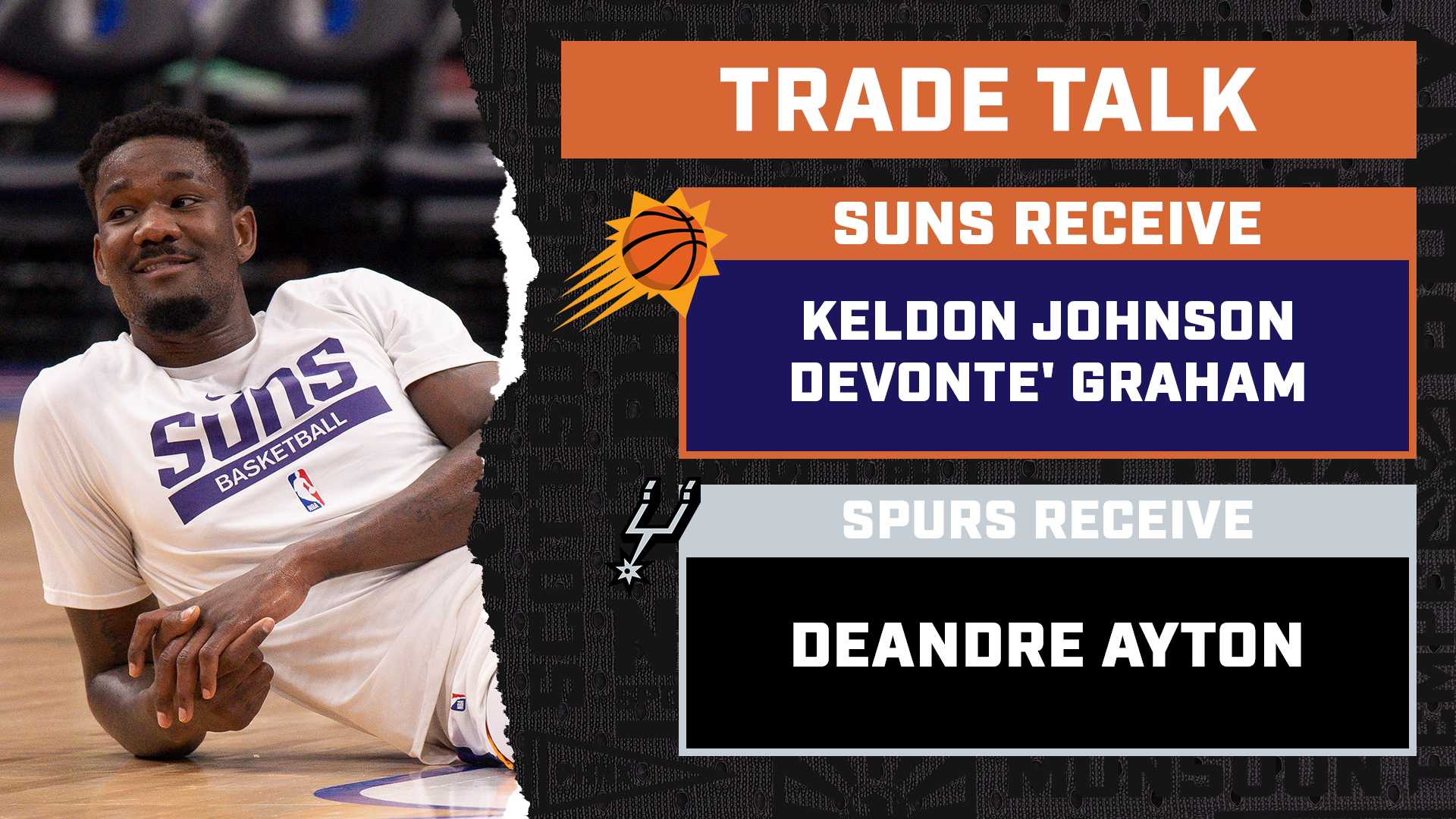
The Suns should ask for the No. 33 pick in this year’s draft while they’re at it, but whatever the case, as long as they’re getting Johnson’s bullish strength, driving ability and scoring at the age of 23, that makes this trade worth it.
If he’s off-limits, the Suns could also look to another Texas team with the room to absorb DA’s salary outright….
Houston Rockets
Jalen Green and Jabari Smith Jr. are either off-limits, too flawed to be on a title contender, or both. That leaves Kevin Porter Jr. and Jae’Sean Tate as the main targets for a DA trade (unless Alperen Sengun was available, at which point we’d need to re-evaluate).
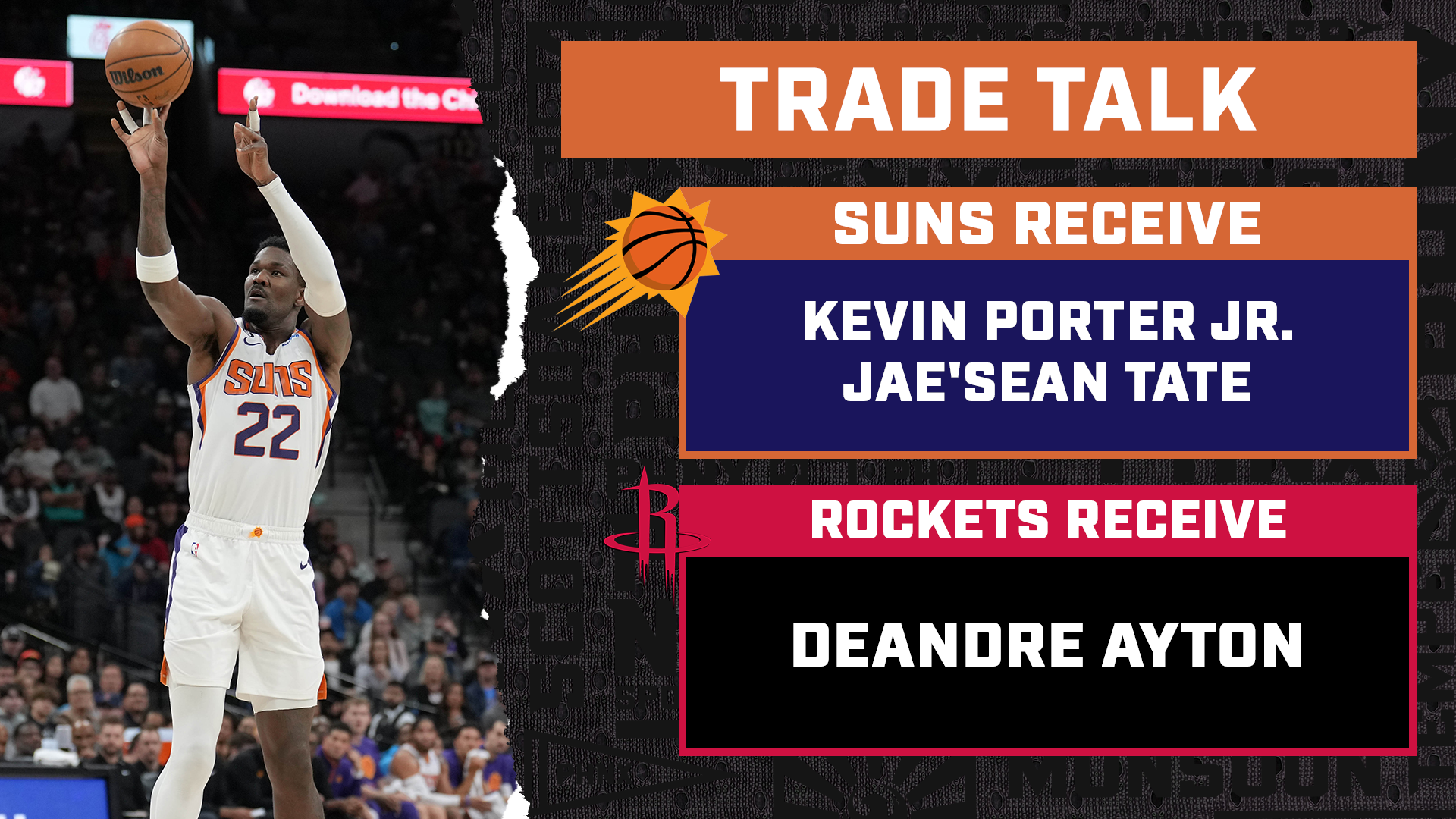
Off-court problems followed Porter during his time at USC in college and Cleveland in the NBA. He’s had incidents in Houston too, serving a one-game suspension in 2022 for a verbal altercation with assistant coach John Lucas. But things seem to have stabilized a bit in an unstable rebuild in Clutch City — or at least, his talent has overshadowed everything else, since the Rockets handed him a four-year, $82.5 million extension last October.
In any case, Porter has scored 50 and recorded multiple triple-doubles before turning 23. He averaged a career-high 19.2 points, 5.7 assists and 5.2 rebounds last year, and while it came on one of the worst teams in the league, he’s clearly capable of filling a stat sheet. Even better, if he proves to be a locker room problem, there is zero guaranteed money on his contract beyond the 2023-24 campaign.
As for Tate, he’s a defensive-minded wing who’s still missing the “3” component to be a 3-and-D wing. It’s far from the best trade package for Ayton though, and it comes with more risks than it’s worth. The Rockets have their sights set on a bigger prize in James Harden, so this type of trade feels like a last resort if both teams strike out elsewhere.
LA Clippers
The Clippers reportedly want to find away to be looped into the Bradley Beal trade as the third team getting Chris Paul. But before we get to that, wouldn’t it be nice to have a quality pick-and-roll partner waiting for the Point God before he even arrives?
With or without Paul, Ayton would probably fit in well alongside Kawhi Leonard and Paul George. He might clog the paint up at times, but his screening would help make their lives a lot easier as well. Everyone outside of the star duo feels attainable to some degree, so there are plenty of combinations to play with.
Most of them revolve around Ivica Zubac, and we’ll start with our most optimistic attempt:
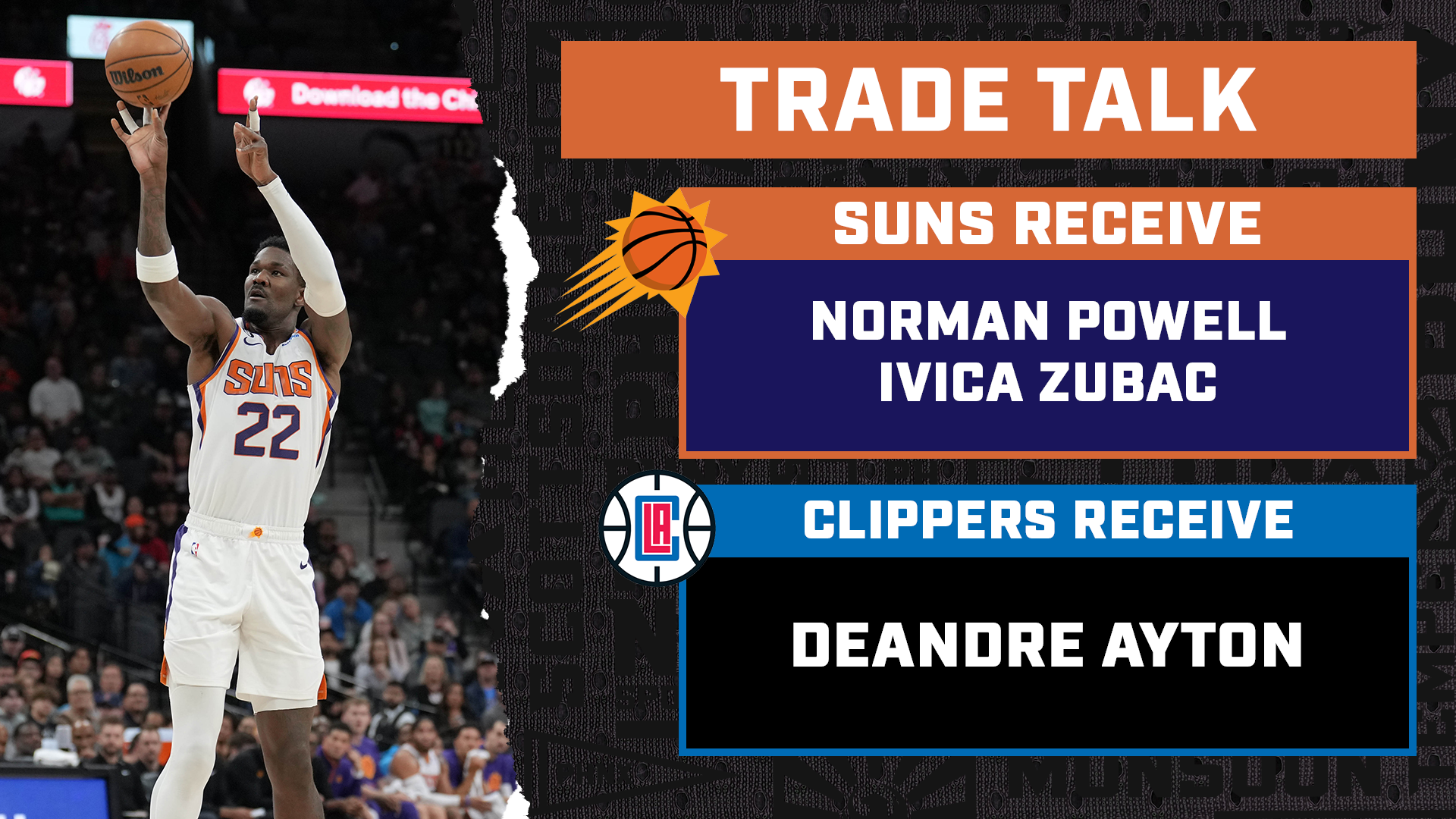
Zubac is an underrated big. He’s not the most mobile center covering pick-and-rolls, but he gives opponents problems in drop coverage, knows his role well and is still only 26 years old. He nearly averaged a double-double last season (10.8 points and 9.9 rebounds per game), was a better shot-blocker than DA (1.3 per game) and cleaned up around the basket, shooting 63.4 percent overall.
With two years and only $22.7 million left on his contract, he’s the exact type of big who can do 80 percent of what Ayton does at one-third of the price.
The Suns also go after Norman Powell in this deal, another high-scoring 2-guard who can get hot in a hurry. For all the concerns (and jokes) about positional overlap, Powell would be a tremendous microwave scorer off the bench, especially when staggered with any of Phoenix’s three main scorers.
Powell just turned 30, but he’s a career 38.6 percent shooter from beyond the arc and he’s averaged at least 16 points per game in each of the last four seasons. The remaining three years and $57.7 million on his contract seems like a lot, but it’s less than $20 million per season and would be movable down the line.
If Powell is off-limits in DA discussions, maybe the Clippers could be talked down to Eric Gordon and No. 30 instead.
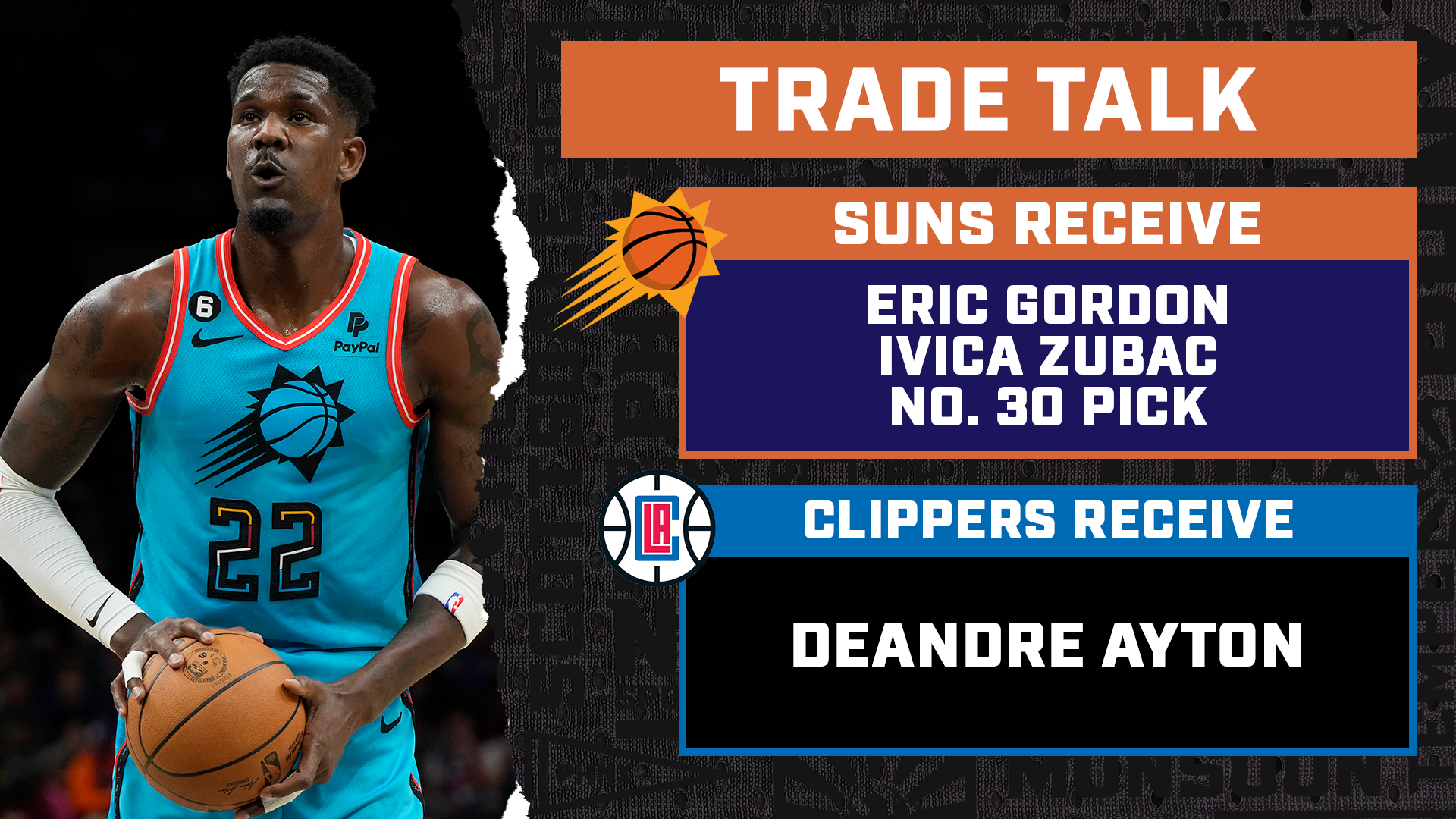
Make your “Suns traded for Gordon three years too late!” jokes if you must, but he was legitimately good for the Clippers last year, averaging 11.0 points in just 24.9 minutes per game while shooting a red-hot 42.3 percent from deep.
The Suns wouldn’t need much more than that out of a 34-year-old coming off the bench. His $20.9 million salary for next year is fully non-guaranteed, so the Suns would have to increase those guarantees to make the math work (which they’d obviously be willing to do if they were trading for him).
If that’s still too much, the Clippers might counter with something like Zubac, Marcus Morris and the 30th overall pick:
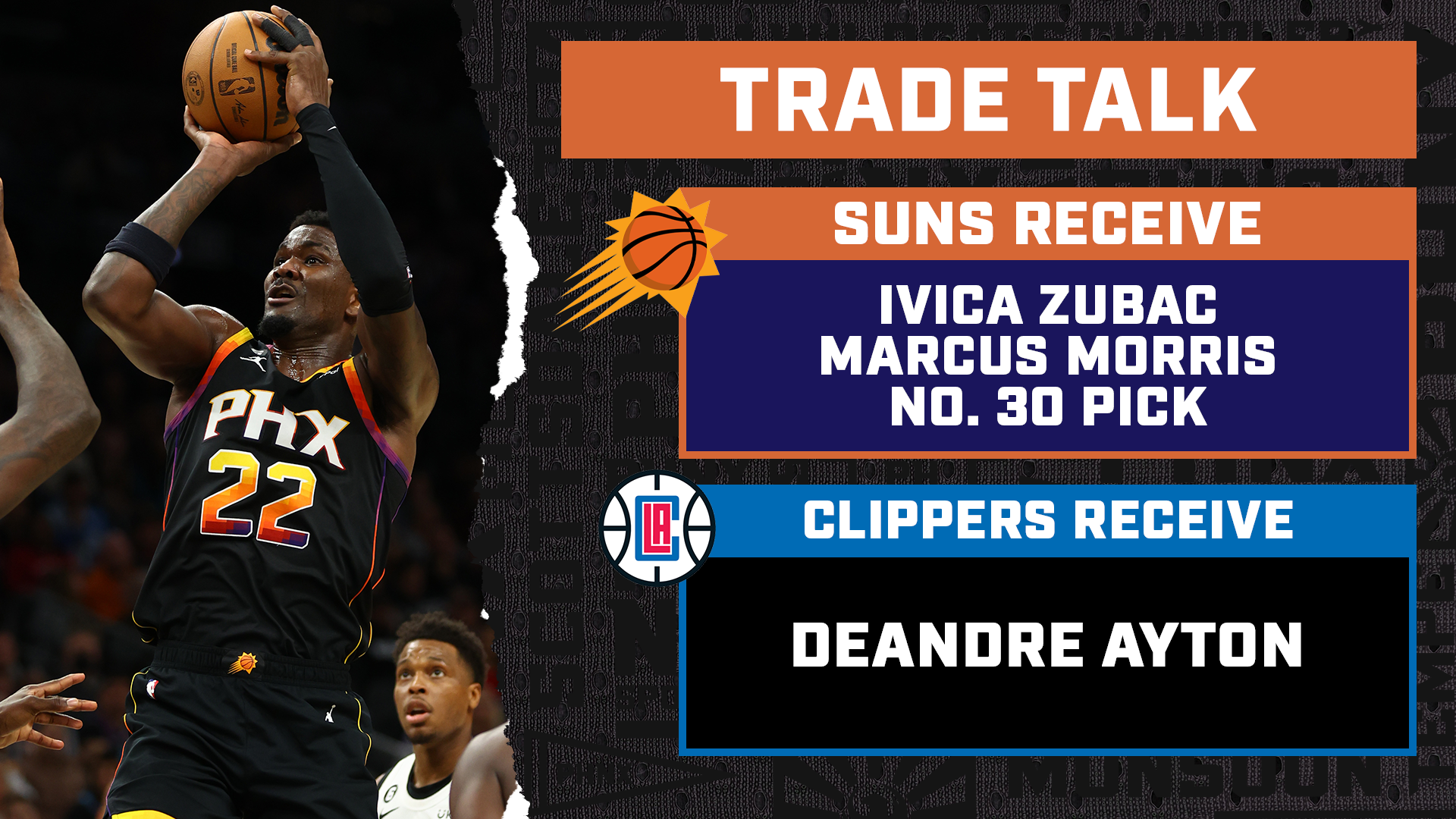
This is probably where the Suns have to decline. Even if Morris hadn’t burned bridges with the fanbase in Phoenix, he’s been on the decline for a while now. A late first-round pick is nice, but again, it feels like a crapshoot with the way the Suns have approached the draft lately.
Zubac, Nicolas Batum, Robert Covington, No. 30 and No. 48 would be an appropriate counter, and even that feels somewhat underwhelming.
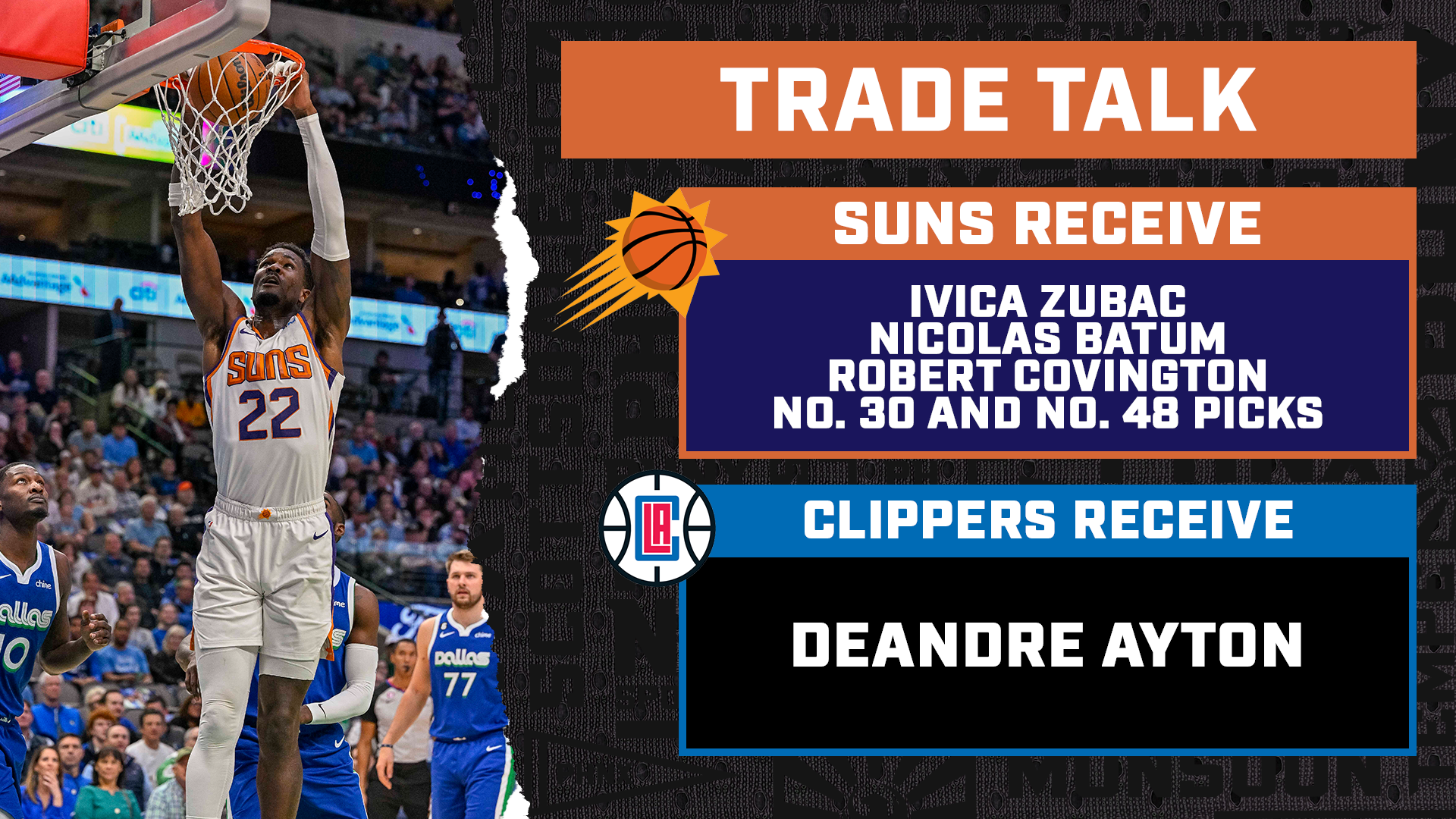
Sure, the Suns are suddenly turning one $32.5 million salary into five warm bodies on the roster, but this might be a good example of prioritizing depth over talent to a fault. Zubac is legitimately good, Batum can help as an experienced 3-and-D wing who’s a career 36.5 percent shooter from deep, Covington is a versatile defender, and adding two rookies feels like something the Suns need to start doing whenever they can.
But Zubac is still a step down from Ayton, Batum is 34, RoCo is 32 and barely played last season, and there’s little reason to believe a front office that’s invested so little time and resources in its scouting department will turn those late picks into NBA-level contributors as rookies.
Maybe looping the Clippers into a three-team trade with the Wizards is a better way to go?
3-team Clippers/Wizards trade
The Clippers want Chris Paul, and now that his time in Phoenix is officially over, Paul probably wants to be back in LA, where his family lives. So how about looping them in with the Beal trade?
We already know the Suns are getting Beal, Jordan Goodwin and Isaiah Todd from the Wizards. Paul would be going to the Clippers, while Landry Shamet is still heading to D.C.
But what if DA is also going to LA? In that case, maybe the Suns have more reason to ask for Zubac and Powell, while the Wizards get Eric Gordon and Marcus Morris for their trouble.
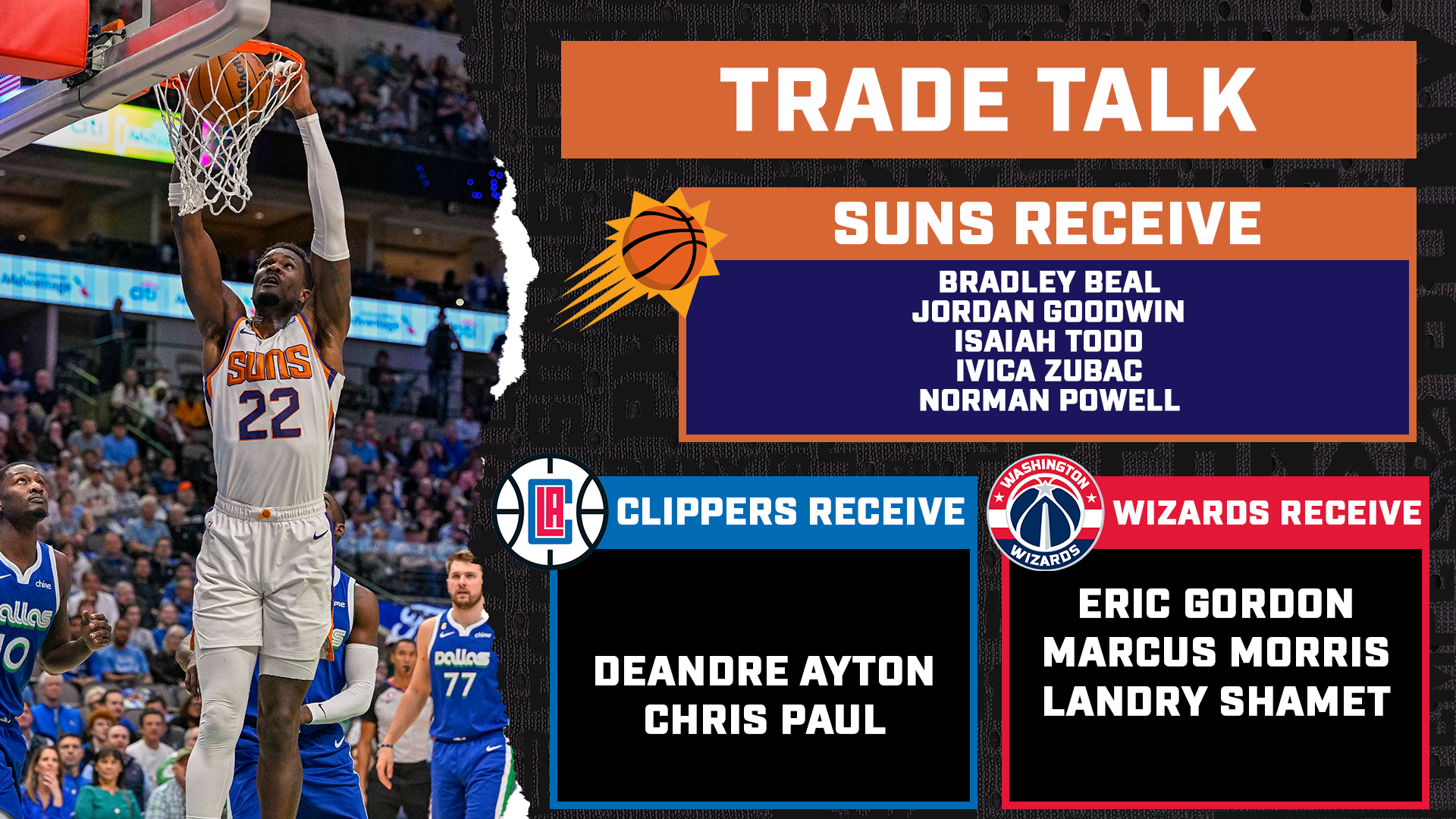
The Suns land Beal, an Ayton replacement in Zubac, a wing scorer in Powell, and two younger prospects for DA, CP3 and Shamet. The Clippers get Paul like they wanted, plus a younger, more dynamic pick-and-roll partner for the aging CP3. And the Wizards get to rebuild with three contracts that have zero guaranteed money on the books beyond this season.
If that’s too steep a price for the Clippers to pay, maybe an alternative like this would suffice:
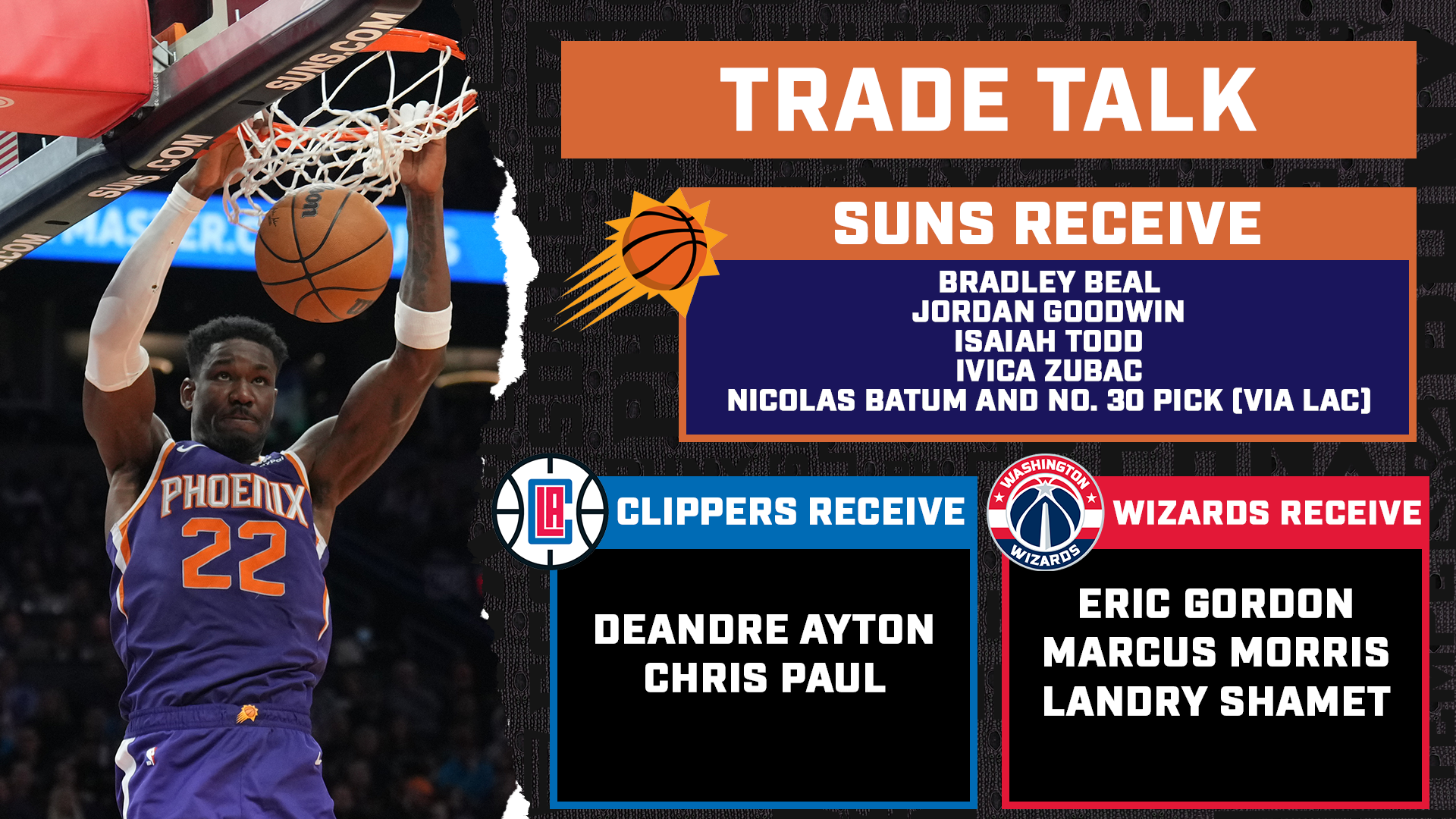
This doesn’t feel like appropriate value for DA being included, but these scenarios are worth thinking about as the Wizards try to find a way to lump in a third team for Paul.
3-team Timberwolves/Hawks trade
One last reporting nugget before we get to the end: Before the Bradley Beal trade, a source told PHNX Sports that the Suns were trying to figure out a three-way trade that would land Karl-Anthony Towns. KAT has obviously been good friends with Booker for years now, and he wanted to find a way to come to Phoenix and create the NBA’s next superteam.
Landing Beal obviously changes that…OR DOES IT?
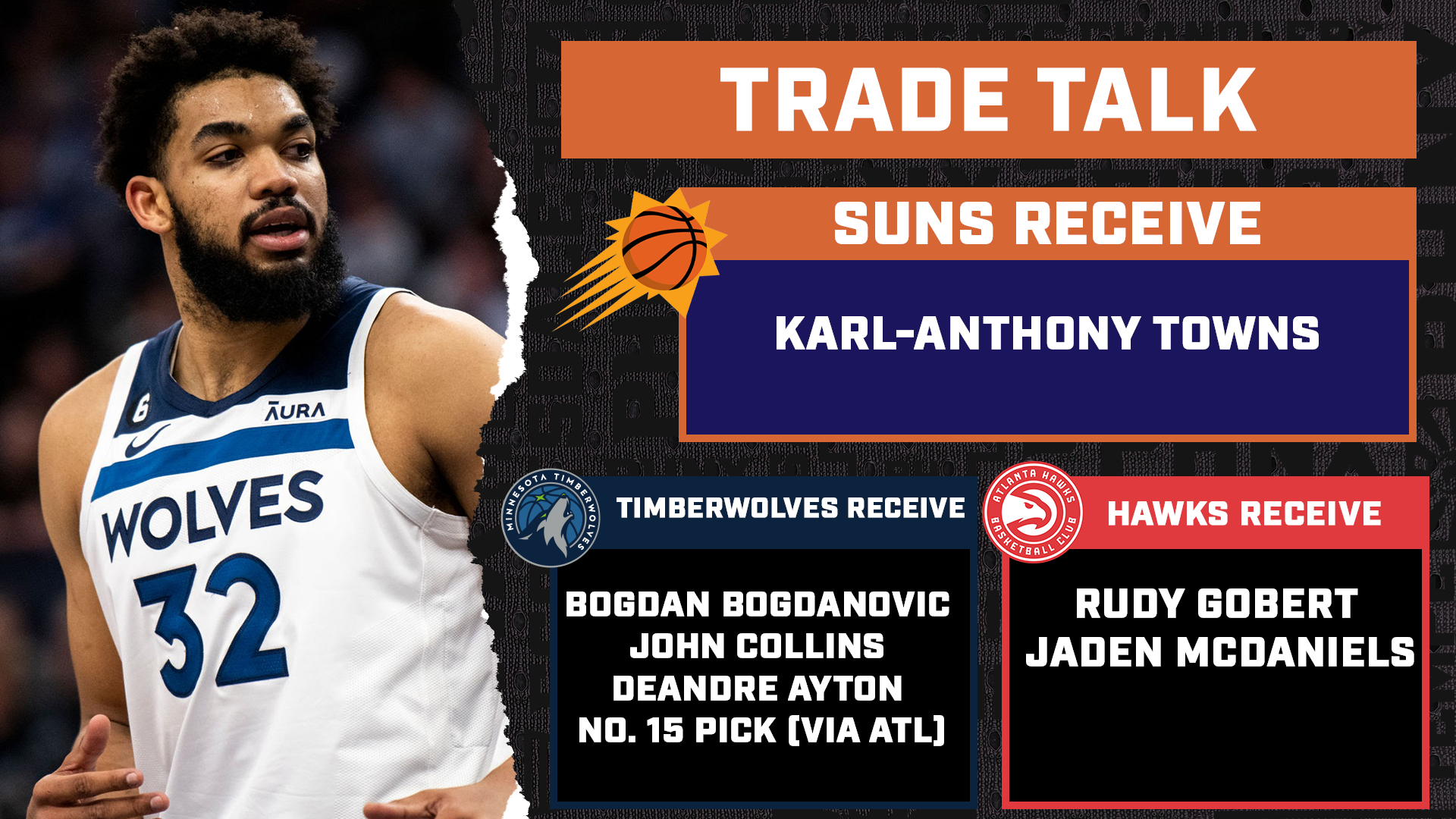
Okay, so maybe this feels unrealistic. The Suns are suddenly so far past the second tax apron that the league would start planning a third and fourth tax apron for the next CBA. Minnesota dumps both KAT and Rudy Gobert after just one year together, and the Hawks probably aren’t getting enough value for Bogdanovic, Collins and a top-15 pick. Bogdanovic can’t be traded until September because of his contract extension, so this is more of a midseason blockbuster, with whatever player Atlanta drafted 15th going to Minnesota.
But also…I kind of don’t hate it for any of these teams? Towns automatically makes the Suns’ Big 4 the most incredible offensive quartet ever assembled, and he’s better-suited as the third or fourth fiddle rather than “the guy.” Imagine him as a super-powered Kevin Love or Chris Bosh, spreading the floor out to the 3-point line. The Suns still can’t guard the Nuggets with KAT, but who can stop Nikola Jokic anyway? Maybe Phoenix’s best path is simply to play five-out and go in guns blazing.
The Wolves, meanwhile, get their fresh start. Sunk costs be damned, they’re moving out of the ill-fated Gobert era, ditching Towns, and building around Anthony Edwards with Bogdanovic, DA, Collins and this year’s No. 15 pick.
Finally, the Hawks get the short end of the stick, giving up significant capital to land Gobert and Jaden McDaniels. But Gobert is a better rim protector than Capela, who they could move in a separate trade to aid their retooling process. McDaniels is a lanky, pesky wing defender who’s still only 22 years old. Bogdanovic and Collins aren’t part of Atlanta’s long-term plans, they get out of Collins’ inflated contract, and at least their expensive roster now has a better chance of covering for Trae Young’s defensive flaws.
It’s outlandish and definitely not happening for a multitude of reasons…but it’s also not as far off as it appears at first glance.
3-team Raptors/Hawks trade
Again, this type of thing definitely isn’t happening, but it’s fun to live on the wild side.
In this scenario, the Suns get their DA replacement with Capela, plus a shooter on the wing with Bey and the 19-year-old AJ Griffin. Toronto lands DA, a player they’ve been rumored to have interest in before, along with Bogdanovic and three picks from Atlanta: whoever the Hawks draft at No. 15 this year, a 2024 first-rounder (via the Sacramento Kings) and a 2028 first-rounder.
So what do the Hawks get in return for all of that?
How does Pascal Siakam sound?
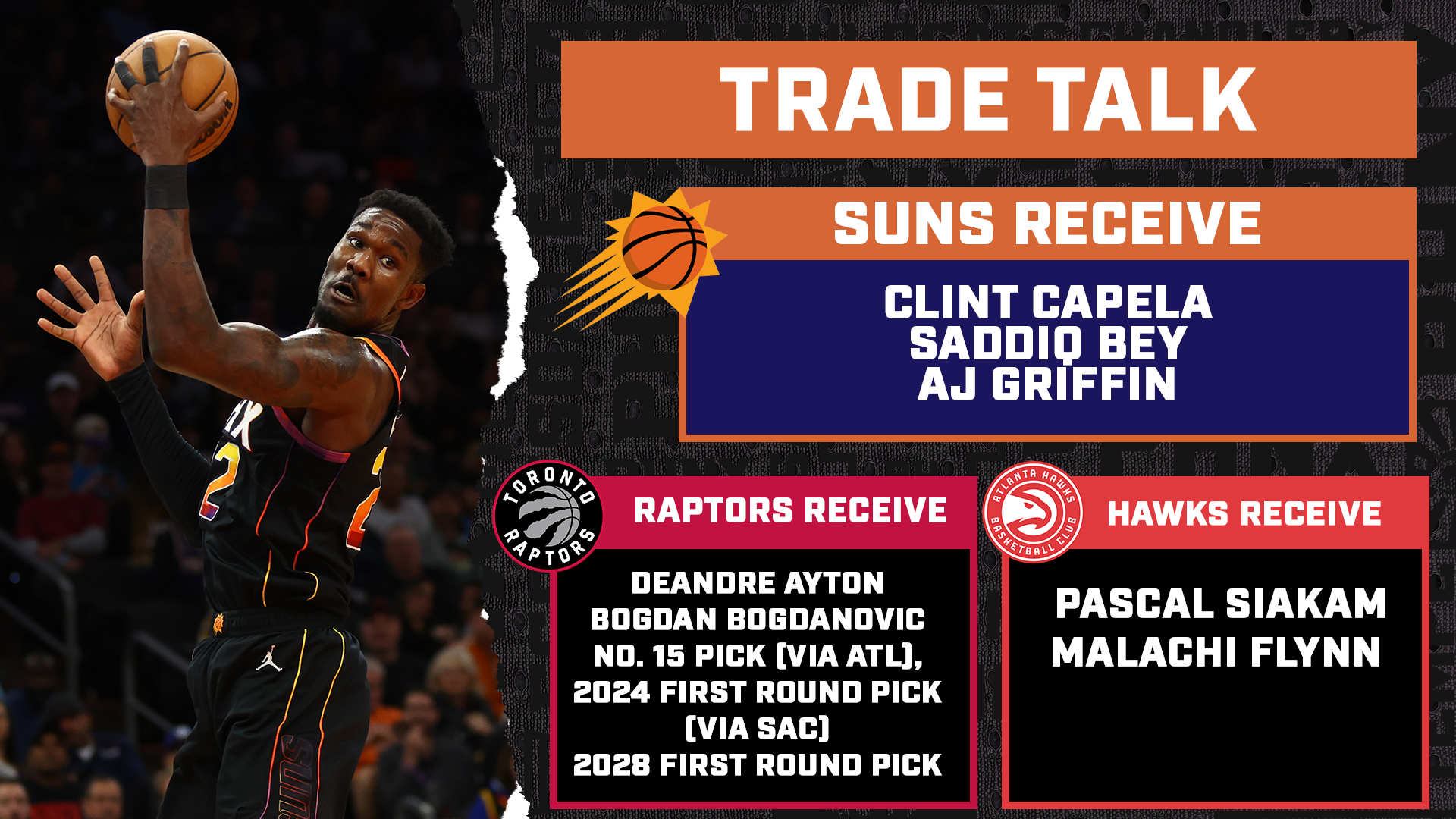
To recap, the Suns move on from DA with a center who might fit Vogel’s system better, a young wing who could become quite a 3-and-D prospect, and Griffin, a youngster who put up 8.9 points per game on 39 percent shooting from deep as a rookie.
The Raptors turn Siakam into DA, Bogdanovic and three first-rounders, while the Hawks smash the rest button by adding Siakam’s two-way skill-set to a core that already had Trae Young and Dejounte Murray.
Those picks might not be valuable enough to appease Toronto, and again, Bogdanovic can’t be traded outside of September but outside of those pesky (important!) details, we’re close with this one.
New Orleans Pelicans
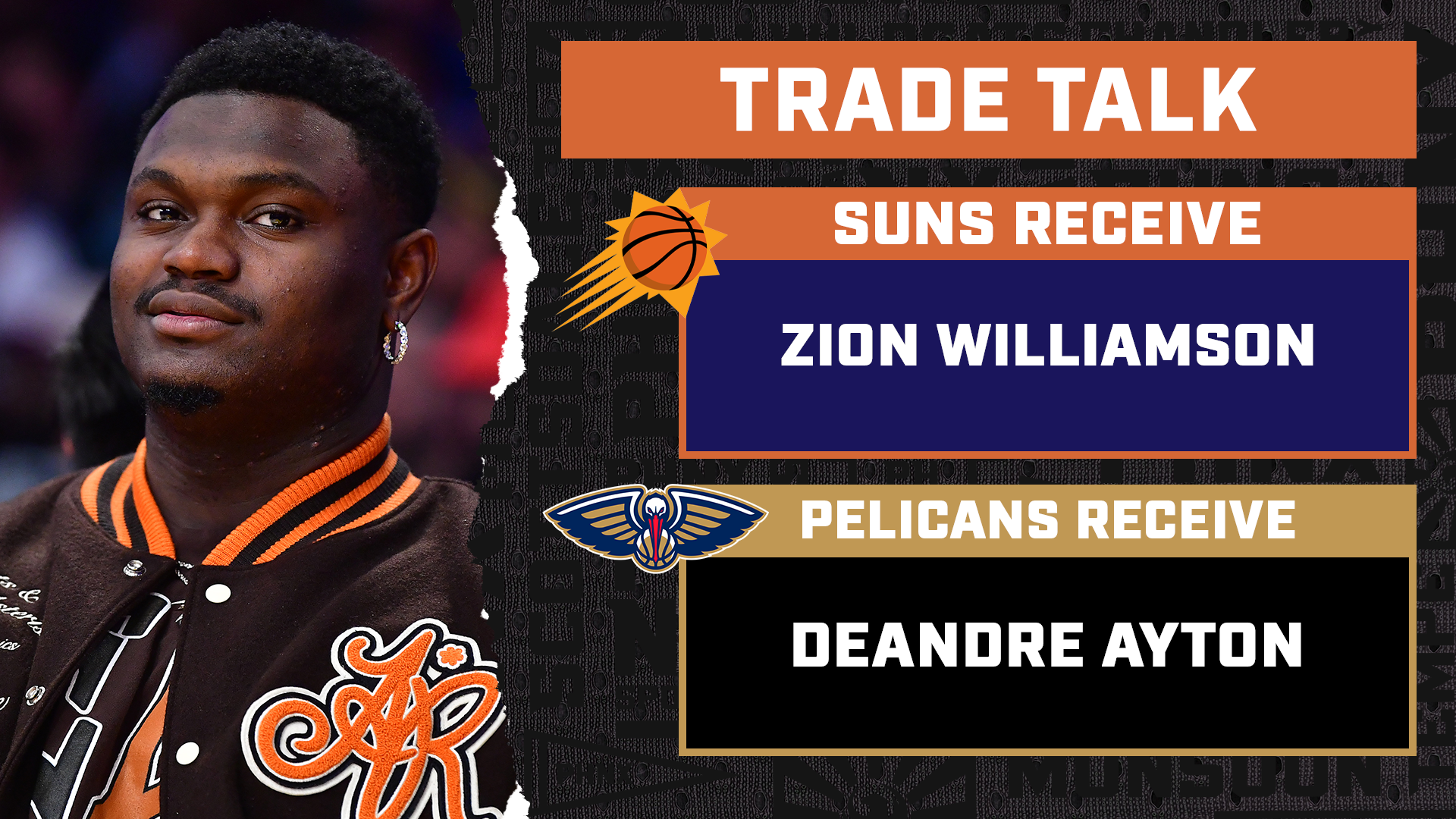
Why not end on an absolutely bat-shit crazy note?
It’ll never happen. Nor should it, considering what’s at stake for Phoenix next year.
But also….let chaos reign.
Comments
Share your thoughts
Join the conversation

The Comment section is only for diehard members
Scroll to next article


